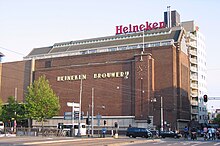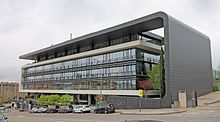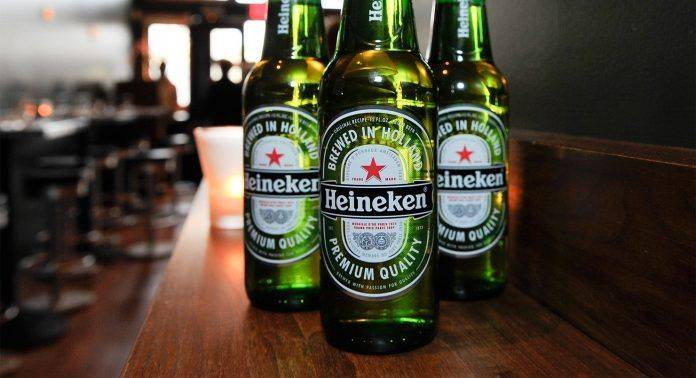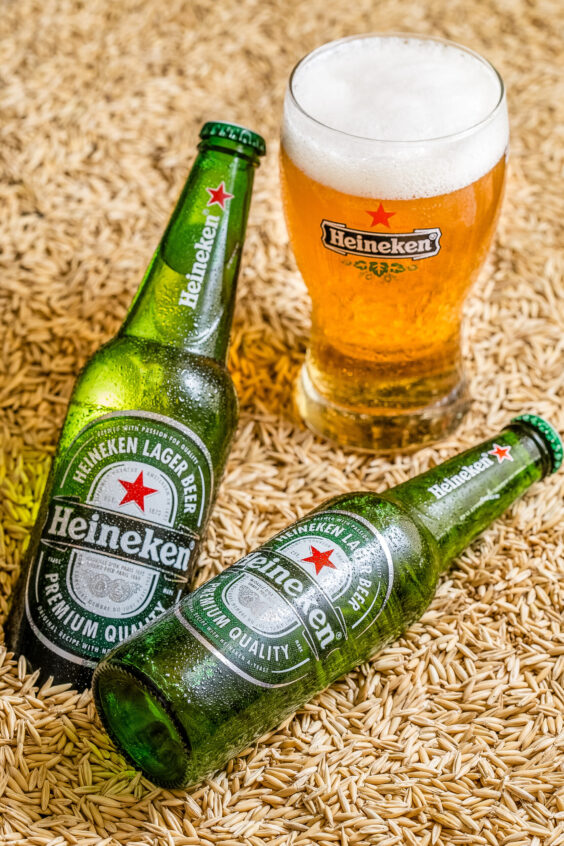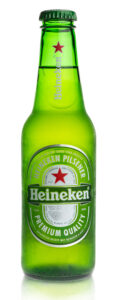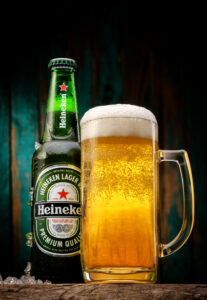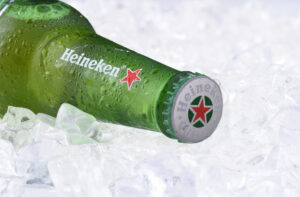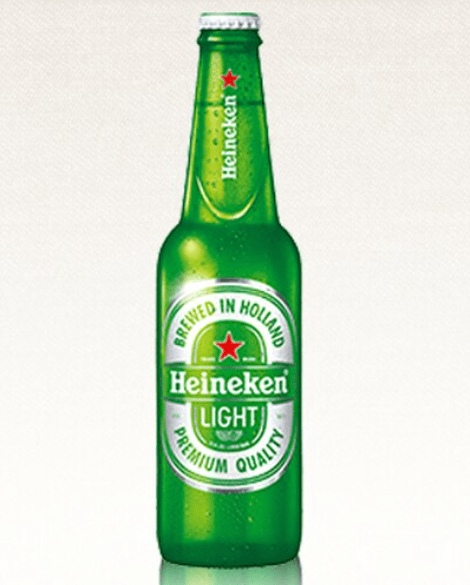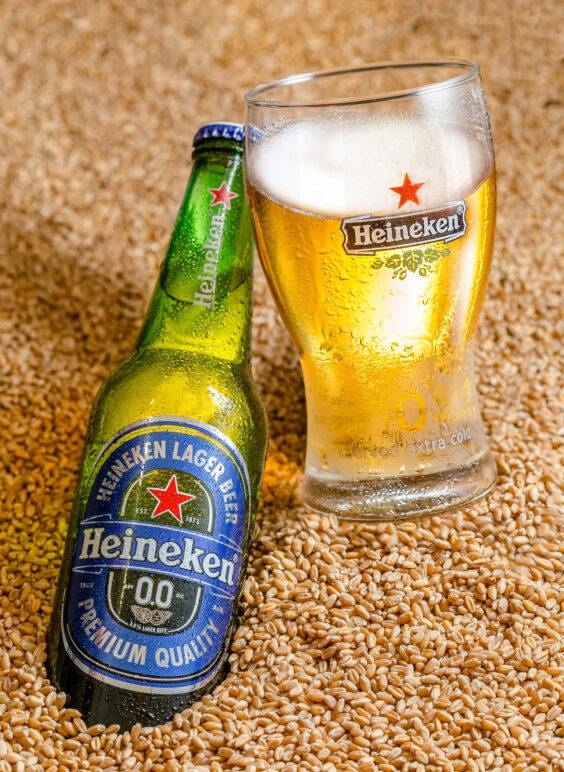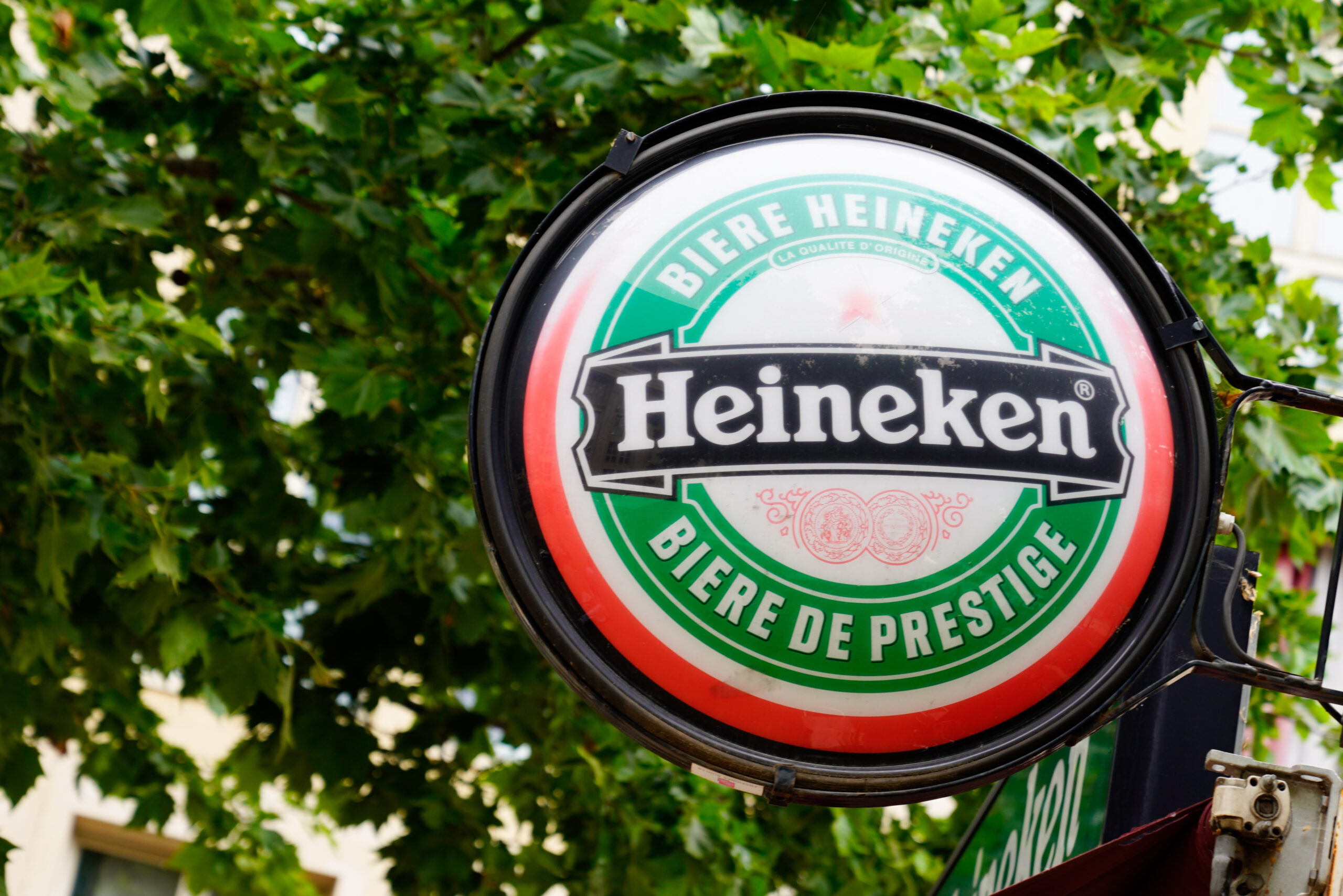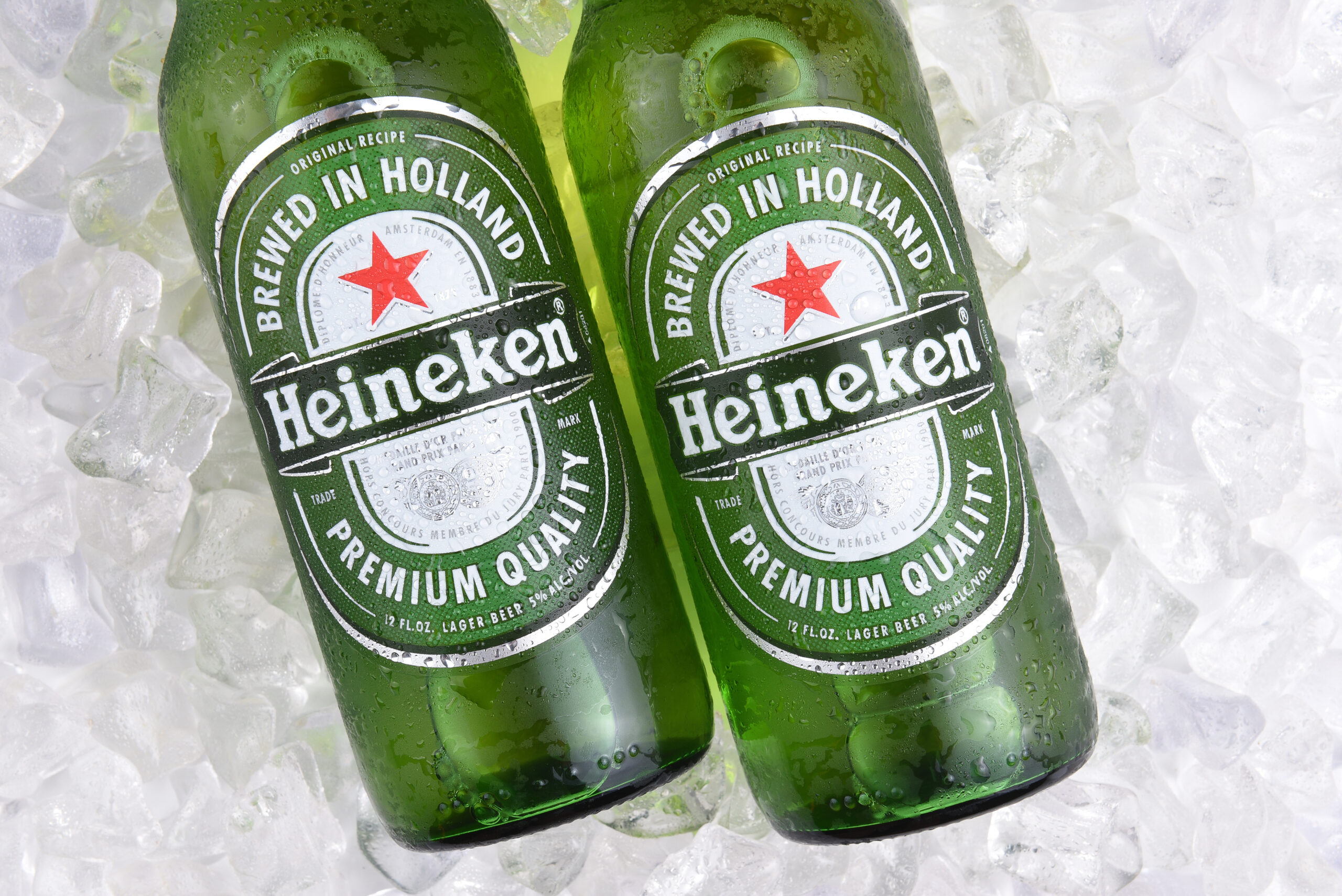Родная страна пива «Хайнекен» — Нидерланды. В 1841 году в Амстердаме родился Герард, один из трех сыновей торговца Корнелиуса Хайнекена. Когда Герарду было 23 года, он купил небольшую пивоварню De Hooiberg, которая на тот момент пребывала в плачевном состоянии.
Герард проявил себя как талантливый предприниматель. Он быстро наладил работу почти загубленного предприятия, а спустя несколько лет расширил производство, построив еще одну пивоварню в пригороде Амстердама. В 1869 году Герард начал создавать пиво по баварской технологии низового брожения (лагеры). Благодаря новой методике напиток получался более чистым и вкусным, чем другие местные сорта.
Лагеры были для Нидерландов в новинку, но пиво быстро стало популярным и какое-то время даже называлось «пивом джентльменов». В 1870 году началась Франко-прусская война — событие печальное, но для пивоварни Хайнекена крайне выгодное. Из-за боевых действий поставки пива из Баварии прекратились, а завод Герарда занял пустующую нишу.
В 1873 году произошло поистине историческое событие — основание компании Heineken’s Bierbrouwerij Maatschappij N.V. Через пару лет компания начала заграничную «экспансию»: продукция бренда появилась в Индонезии и Франции. Это десятилетие ознаменовалось еще одним важным достижением — пиво «Хайнекен» получило золотую медаль на Международной выставке (Париж) и удостоилось еще нескольких престижных наград.
В 1880-е годы компания провела модернизацию производства. На предприятиях внедрили систему охлаждения, начала активно работать исследовательская лаборатория, которую в 1886 году возглавил легендарный Хартог Элион. Именно он вывел знаменитые штаммы дрожжей Heineken A-Yeast и D-Yeast. Эти культуры по сей день используются для создания пива Heineken, производитель «не изменяет» одному из главных достояний бренда.
Герард Хайнекен много внимания уделял качеству продукции и наращиванию производственных мощностей, а вот маркетингом и условиями труда рабочих почти не занимался. После смерти Герарда семейная компания досталась его сыну Генри, но на момент вступления в наследство Хайнекену-младшему было всего семь лет.
Пока мальчик рос и получал образование, делами фирмы занимался его отчим Юлиус Петерсон. Он приложил немало усилий, чтобы наладить отношения с рабочим коллективом: заключил с сотрудниками трудовые договора (в те годы это было большой редкостью), увеличил зарплату и сократил количество часов работы.
В 1914 году уже взрослый Генри Хайнекен взял управление компанией в свои руки. Он модернизировал производство, создал пенсионный фонд для сотрудников и начал интеграцию на рынки Азии и США. Генри руководил семейным бизнесом до 1940 года. Спустя год пост главы компании занял его сын Альфред, или просто Фредди.
Сейчас в это сложно поверить, но поначалу Фредди совсем не интересовался бизнесом. Казалось, этот легкомысленный юноша приведет компанию к краху. Для «Хайнекена», чье пиво к тому моменту знал почти весь мир, настали тяжелые времена. Ситуацию усугубила Вторая мировая война. Генри даже пришлось продать акции, принадлежавшие семье.
Но в послевоенные годы произошло чудо: Фредди Хайнекен взялся за ум и прошел «курс молодого бойца» у американского партнера компании Лео ван Мунчинга. Альфред оказался гениальным предпринимателем. Уже в 1954 году он выкупил проданные его отцом акции и повел семейный бизнес к процветанию. Для Heineken началась «золотая эра».
Ни в какой другой период компания не росла так активно, как в годы работы Фредди Хайнекена. Он вкладывал огромные деньги в рекламу, и эти траты окупались сторицей. Альфред также активно скупал другие бренды и пивзаводы. По его инициативе в портфеле компании появились не только новые бренды пива, но и ликеры, виски и другой алкоголь. Heineken увеличила свое присутствие на всех значимых рынках. Компания скупала заводы и налаживала производство своих напитков по лицензии. Сегодня продукция бренда представлена в 70 государствах. Так что теперь страна-производитель пива «Хайнекен» — не только Нидерланды. Один из слоганов бренда — «Родился в Нидерландах, вырос в мире».
Фредди управлял компанией до 1989 года, но и после своего ухода с поста генерального директора продолжал принимать участие в жизни корпорации. После увольнения Альфреда должность руководителя занимали (и продолжают занимать) не члены семьи Хайнекен, а нанятые специалисты. По состоянию на 2021 год исполнительным директором «Хайнекен» является Жан-Франсуа ван Боксмеер.
Альфред Хайнекен умер в 2002 году. Принадлежавшие ему акции унаследовала его дочь Шарлен де Карвальо-Хайнекен. Полученное наследство автоматически сделало ее богатейшей женщиной Нидерландов.
В Россию «Хайнекен» пришел в 2002 году. По состоянию на 2021 год у компании 7 заводов в РФ:
- филиал «Патра» в Екатеринбурге;
- филиал «Пивоварня Хейнекен Байкал» в Иркутске;
- филиал «Волга» в Нижнем Новгороде;
- филиал «СПХ» в Новосибирске;
- «Пивоварня Хейнекен» в Санкт-Петербурге;
- филиал «Шихан» в Стерлитамаке;
- филиал «Амур-пиво» в Хабаровске.
В портфеле российского представительства «Хайнекен» более 30 брендов, причем само пиво Heineken выпускают только на двух заводах из семи: в Санкт-Петербурге и Нижнем Новгороде.

Corporate logo since 2011 |
|
| Type | Naamloze vennootschap |
|---|---|
|
Traded as |
|
| ISIN | NL0000009165 |
| Industry | Brewing |
| Founded | 15 February 1864; 159 years ago |
| Founder | Gerard Adriaan Heineken |
| Headquarters |
Amsterdam , Netherlands |
|
Area served |
Worldwide |
|
Key people |
Dolf van den Brink (Chairman/CEO)[1] Laurence Debroux (CFO)[1] |
| Products | Heineken brands |
| Revenue | |
|
Operating income |
|
|
Net income |
|
| Total assets | |
| Total equity | |
| Owner | Charlene de Carvalho-Heineken (23%)[3] Fomento Económico Mexicano (14.8%)[4] |
|
Number of employees |
82,257 (2021)[2] |
| Website | theheinekencompany.com |
Heineken N.V. (Dutch pronunciation: [ˈɦɛinəkə(n)]) is a Dutch multinational brewing company, founded in 1864 by Gerard Adriaan Heineken in Amsterdam. As of 2019, Heineken owns over 165 breweries in more than 70 countries. It produces 348 international, regional, local and speciality beers and ciders and employs approximately 85,000 people.[5]
With an annual beer production of 24.14 billion litres in 2019, and global revenues of 23.894 billion euro in 2019,[6] Heineken N.V. is the number one brewer in Europe and one of the largest brewers by volume in the world.[7] Heineken’s Dutch breweries are located in Zoeterwoude, ‘s-Hertogenbosch and Wijlre. The original brewery in Amsterdam, closed in 1988, is preserved as a museum called Heineken Experience.
Since the merger between the two largest brewing empires in the world, Anheuser-Busch InBev and SABMiller, in October 2016, Heineken has been the second-largest brewer in the world.[8]
History[edit]
Corporate logo used until 2011
Exterior of the former Heineken brewery in Amsterdam on Stadhouderskade and Ferdinand Bolstraat
Gerard Adriaan Heineken[edit]
The Heineken company was founded in 1864 when the 22-year-old Gerard Adriaan Heineken bought a brewery known as De Hooiberg (the haystack) in Amsterdam. In 1869 Heineken switched to the use of bottom-fermenting yeast. In 1873 the brewery’s name changed to Heineken’s Bierbrouwerij Maatschappij (HBM), and opened a second brewery in Rotterdam in 1874. In 1886 Dr. H. Elion, a pupil of the French chemist Louis Pasteur, developed the «Heineken A-yeast» in the Heineken laboratory. This yeast is still the key ingredient of Heineken beer.
Henry Pierre Heineken[edit]
The founder’s son, Henry Pierre Heineken [nl], managed the company from 1917 to 1940, and continued involvement with the company until 1951. During his tenure, Heineken developed techniques to maintain consistent beer quality during large-scale production.
After World War I, the company focused more and more on exports. Three days after Prohibition ended in the United States, the first Heineken shipment landed in New York. From that day on, Heineken has remained one of the most successful imported beer brands in the United States.
Alfred Henry Heineken[edit]
Henry Pierre’s son, Alfred Henry «Freddy» Heineken, started working at the company in 1940, and in 1971 was appointed Chairman of the Executive Board. He was a powerful force behind Heineken’s continued global expansion, and while he retired from the Executive Board in 1989, he maintained involvement with the company until his death in 2002.
During this period, Heineken tried to increase its stock price by purchasing competing breweries and closing them down. After World War II, many small breweries were bought or closed. In 1968 Heineken merged with its biggest competitor, Amstel, and in 1975 opened a new brewery in Zoeterwoude. The Amstel brewery was closed in 1980, and its production moved to Zoeterwoude and Den Bosch.
Present[edit]
With the part acquisition of Scottish and Newcastle in 2007/2008 Heineken became the third-largest brewer based on revenues, behind the Belgian-Brazilian AB InBev and the British-South African SAB.
Since the merger between Anheuser-Busch InBev and SABMiller in October 2016, Heineken became the second largest brewer in the world.[9]
On 12 January 2010, Heineken International successfully bought the brewery division of Mexican giant FEMSA in all-stock deal expanding its reach throughout Latin America. The deal brought brands such as Dos Equis XX, Bohemia and Sol under Heineken ownership. Thru the deal, Heineken also started selling its products in Latin America through FEMSA’s distribution network. The deal made FEMSA 20% owner of Heineken N.V. essentially becoming its largest single shareholder after the Dutch families (Heineken family and Hoyer family) who owns 25.83% and public shareholders owning 54.17%.[10]
The FEMSA acquisition is expected to keep Heineken in its strong position by growing its market share in the Latin American markets. FEMSA has a massive distribution network and owns Mexico’s largest convenience store chain OXXO, which has thousands of locations throughout the country.
In September 2014, it was announced that Heineken would sell its Mexican packaging business Empaque to Crown for around $1.23 billion.[11] Also during that month, Heineken revealed it was in talks to sell its Czech operations to Molson Coors.[12]
On 10 September 2015, Heineken International announced it would acquire a 50% stake in Lagunitas Brewing Company of Petaluma, California as part of an effort to allow Lagunitas to expand its operations globally. As part of the deal Lagunitas will no longer be considered a craft brewer as the Heineken stake is greater than 25%.[13]
In January 2017, Heineken announced it was in negotiations to buy the Kirin Company’s 12 breweries in Brazil.[8] The following month, Heineken closed the deal and bought Brasil Kirin for US$700 million.[14]
After previously acquiring 50% of Lagunitas Brewing Company, Heineken announced, on 4 May 2017, it would be purchasing the remaining 50%—making it the sole owner of Lagunitas.[15]
In June 2018, Heineken named Maggie Timoney as the CEO of Heineken USA, making her the first woman to become the CEO of a major United States beer supplier.[16]
In 2018, Heineken signed an agreement with China Resources Enterprises to purchase a 40% stake into the company.[17]
Global structure[edit]
Heineken organises the company into five territories which are then divided into regional operations.[18] The regions are: Western Europe, Central and Eastern Europe, The Americas, Africa and the Middle East, and Asia Pacific. These territories contain 115 brewing plants in more than 65 countries,[19] brewing local brands in addition to the Heineken brand.
Executive team[edit]
The executive team of the company consists of the following people:[20]
- Dolf van den Brink, Chairman Executive Board/CEO
- Harold van der Broek, Member Executive Board/CFO
- Marc Busain, President Americas
- Jacco van der Linden, President Asia Pacific
- Chris Van Steenbergen, Chief Human Resources Officer
- Marc Gross, Chief Supply Chain Officer
- Jan Derck van Karnebeek, Chief Commercial Officer
- Roland Pirmez, President Africa, Middle East and Eastern Europe
- Blanca Juti, Chief Corporate Relations Officer
- Soren Hagh, President Europe
Brewing plants[edit]
Heineken’s brewing plants have been designed and engineered in 4 main parts of the world.[21]
Africa and the Middle East[edit]
Heineken has 17 operating companies in Africa and the Middle East.[22]
These include:
- Brasseries du Maroc, Morocco
- Al Ahram Beverages Company, Egypt
- Amstel Brewery, Jordan
- Harar Brewery, Ethiopia
- Bralirwa, Rwanda
- Brarudi, Burundi
- Brasserie Almaza, Lebanon
- Brasseries de Bourbon, Réunion
- Bralima, Democratic Republic of the Congo
- Consolidated Breweries, Nigeria
- Groupe Castel Algérie, Algeria
- Nigerian Breweries, Nigeria
- Société nouvelles des Brasseries SONOBRA, Tunisia
- Sierra Leone Brewery Limited, Sierra Leone
- Sedibeng Brewery, South Africa
- Tango Brewery, Algeria
Asia Pacific[edit]
Breweries in Asia Pacific:[22]
- Cambodia Brewery Ltd (CBL) in Cambodia
- Shanghai Asia Pacific Brewery in China
- Hainan Asia Pacific Brewery Company Ltd in China
- Guangzhou Asia Pacific Brewery in China (under construction)
- Multi Bintang Indonesia in Indonesia
- Lao Asia Pacific Brewery in Laos
- Sungai Way Brewery in Malaysia
- DB Breweries in New Zealand
- South Pacific Brewery Ltd (SPB) in Papua New Guinea
- Asia Pacific Breweries in Singapore
- Asia Pacific Brewery Lanka Limited (APB Lanka) in Sri Lanka
- Thai Asia Pacific Brewery in Thailand
- Heineken Vietnam Brewery Co Ltd in Vietnam
- Heineken Hanoi Brewery Co Ltd in Vietnam
- United Breweries Ltd Bangalore in India
Europe[edit]
Heineken offices in Madrid, Spain
Heineken advertisement on the face of a prominent building on O’Connell Street, Dublin, Ireland
Breweries in Europe:[22]
- Brau Union Österreich in Austria
- Syabar Brewing Company in Belarus
- Alken-Maes in Belgium
- Zagorka Brewery in Bulgaria
- Karlovačka pivovara in Croatia
- Starobrno in the Czech Republic
- Federation Breweries in Gateshead, England (closed 2010)[23]
- H. P. Bulmer in Hereford in England
- John Smith’s in Tadcaster, England
- Royal Brewery in Manchester, England
- Heineken France:
- Brasserie de l’Espérance in Schiltigheim
- Brasserie Pelforth in Mons-en-Baroeul
- Brasserie de la Valentine in Marseille
- Brasserie Fischer in Schiltigheim (closed 2009)
- Brasserie Adelshoffen in Schiltigheim (closed 2000)
- Brasserie Mutzig in Mutzig (closed 1989)
- Athenian Brewery in Greece
- Heineken Hungária in Hungary
- Heineken Ireland at Lady’s Well Brewery in Cork, Ireland
- Heineken Italia in Italy
- Heineken Nederland in the Netherlands
- Żywiec Brewery in Poland
- Central de Cervejas in Portugal
- Heineken Romania in Romania
- Heineken Brewery LLC in Russia
- Heineken Srbija in Serbia
- Caledonian Brewery, Edinburgh, Scotland
- Heineken Slovensko in Slovakia
- Heineken España in Spain, with breweries in Seville, Valencia, Jaén and Madrid
- Heineken Switzerland in Switzerland
- Calanda Bräu in Switzerland
- Pivovarna Laško Union in Slovenia
The Americas[edit]
Breweries in the Americas:[22]
- Brasserie Nationale d’Haiti in Haiti
- Commonwealth Brewery in the Bahamas
- Cervejarias Kaiser in Brazil
- Cervecería Cuauhtémoc Moctezuma in Mexico
- Cervecerías Barú-Panama, S.A. in Panama
- Desnoes & Geddes in Jamaica
- Lagunitas Brewing Company in the United States
- Windward & Leeward Brewery in Saint Lucia
- Surinaamse Brouwerij in Suriname
On 20 January 2017, Heineken NV and Kirin Holdings confirmed they were in negotiations for Heineken to acquire Kirin’s beer operations in Brazil. Kirin had earlier bought assets in Brazil in 2011 with the local brewer Schincariol, which makes Nova Schin and Baden Baden.[24]
Beer brands[edit]
Heineken International owns a worldwide portfolio of over 170 beer brands, mainly pale lager, though some other beer styles are produced. The two largest brands are Heineken and Amstel; though the portfolio includes Cruzcampo, Affligem, Żywiec, Starobrno, Tiger Beer, Zagorka, Red Stripe, and Birra Moretti. Heineken has added a cider blend named Jillz to their list of brands. Since mid-2007, Heineken has also taken ownership of former S&N International brands such as Strongbow and Bulmers Ciders and John Smith’s and Newcastle Brown Ale.[25] Heineken owns the Czech brand Dačický, which was brewed in Kutná Hora from 1573 until Heineken took ownership of it, and closed the brewery.[26] In 2010, Heineken bought Mexican brewery FEMSA Cerveza, including brands Tecate, Sol, Dos Equis, Indio and Kloster.
Ownership[edit]
The shares of Heineken International are traded on the NYSE Euronext Amsterdam and OTCQX under the symbols: HEIA and HEINY respectively. As at 31 December 2013, the shareholding in the group’s stock was as depicted in the table below:[27]
| Rank | Name of Owner | % Ownership |
|---|---|---|
| 1 | Heineken Holding N.V1 | 50.005 |
| 2 | Fomento Económico Mexicano, S.A.B. de C.V2 – FEMSA | 12.532 |
| 3 | Others | 37.463 |
| Total | 100.00 |
- Heineken Holding N.V is a public company listed on the NYSE Euronext Amsterdam. Its single investment is Heineken International. It is majority owned by L’Arche Green N.V an investment vehicle of the Heineken family and the Hoyer family.
- Fomento Económico Mexicano, S.A.B. de C.V (FEMSA) holds an additional 14.935% in Heineken Holding N.V bringing the total direct and indirect shareholding in Heineken International to 20%.
Marketing[edit]
Advertising[edit]
Heineken’s main advertising slogan in the UK was «Refreshes the parts other beers cannot reach»,[28] some of which featured voice-over narration by Danish comedian/pianist Victor Borge. The British TV campaign ran for over 30 years – stopping in 2005.[29][30] From March 2011 they have been advertising using the song ‘The Golden Age’ by The Asteroids Galaxy Tour. After the success of The Entrance, a web advert (4M views in YouTube), Heineken launched The Date in May 2011.[31]
In March 2017 in Amsterdam, Heineken opened a pop-up bakery for five days to promote the yeast used in its brewing. The bread was made by Mark Plaating and proceeds were donated to a local baking guild.[32]
[edit]
Heineken sponsors several sporting events. The Heineken Cup was an annual rugby union knock-out competition involving leading club, regional and provincial teams from the Six Nations: England, France, Scotland, Wales, Ireland, and Italy. Heineken was the title sponsor from the cup’s inaugural tournament in 1995–96, until the tournament ceased in 2014 and was replaced by the Champions Cup. Heineken continued its sponsorship of European Club Rugby as the principle partner of the European Rugby Champions Cup returning to title sponsorship of the Champions Cup from 2018–19. They have been credited as the Founding Partner of European Rugby.
Heineken has been an integral partner of the UEFA Champions League since 2005, with a theme of «Enjoyed together around the world.»[33] The Heineken Open (tennis) is a tennis tournament on the ATP International Series played in Auckland, New Zealand. Heineken also sponsors the music events: the Heineken Open’er Festival, a contemporary music festival held in Poland; and, since 2004, the Oxegen music festival in Ireland. Heineken sponsors the Ballyheigue Summerfest in County Kerry, Ireland. In 2016, Heineken became the Official Beer of the Formula One World Championship after the Canadian Grand Prix.[34] During the knockout stage of the 2019–20 season, Heineken 0,0% became the official beer of the UEFA Europa League as the season resumed followed with the start of the 2020–21 season.[35]
Holland Heineken House[edit]
Since 1992 Heineken organises, together with NOC*NSF, the Dutch meeting place at all the Olympic Games, called the Holland Heineken House.
Heineken Experience[edit]
The Heineken Experience is a museum about Heineken Pilsener and the Heineken brewery, based in the original brewery in Amsterdam. The original building was built in 1867, and was in use as a brewery until 1988.[36] In 1991, when part of the establishment was torn down, the Heineken Reception and Information Centre (Dutch: Heineken ontvangst- en informatiecentrum) was opened in the remaining building. In 2001 the name was changed to Heineken Experience.[37]
The museum features «rides», interactive exhibits, and two bars. It also gives an insight into the company’s history and brewing processes through the years. Visitors receive one small tasting glass and two full-sized glasses of Heineken beer to drink at the end of the tour, both paid for by the 21 euro entry fee.[citation needed]
Controversies[edit]
|
|
This article’s Criticism or Controversy section may compromise the article’s neutrality by separating out potentially negative information. Please integrate the section’s contents into the article as a whole, or rewrite the material. (March 2021) |
Price fixing[edit]
On 18 April 2007 the European commission fined Heineken €219.3m, Grolsch €31.65m and Bavaria €22.85m for operating a price fixing cartel in the Netherlands, totalling €273.7m. InBev, (formerly Interbrew), escaped without a penalty because it provided «decisive information» about the cartel which operated between 1996 and 1999 and others in the EU market. The brewers controlled 95% of the Dutch market, with Heineken claiming a half and the three others 15% each.[38]
Neelie Kroes said she was «very disappointed» that the collusion took place at the very highest (boardroom) level. She added, Heineken, Grolsch, Bavaria and InBev tried to cover their tracks by using code names and abbreviations for secret meetings to carve up the market for beer sold to supermarkets, hotels, restaurants and cafes. The price fixing extended to cheaper own-brand labels and rebates for bars.[38]
In 2004 Heineken and Kronenbourg (then part of Scottish and Newcastle), the two dominant brewers in France, were fined €2.5m – with the penalty reduced for co-operating.[38]
This is simply unacceptable: that major beer suppliers colluded to up prices and to carve up markets among themselves[38]
— Neelie Kroes, EU Competition Commissioner
New investments in Russia[edit]
At the end of March 2022, over a month after Russia started its war in Ukraine, Heineken announced that it was leaving Russia (including with its other brands there, like Affligem, Amstel etc.), saying that ownership of the Russian subsidiary was no longer “durable or viable.” But despite this promise Heineken hired more than 240 new staff and launched no less than 61 new products on the Russian market last year, investigators from Follow the Money[39] reported, based on an overview of 2022 by Heineken Russia. The Dutch brewer’s Russian subsidiary looked back on “a turbulent year, with many new growth opportunities.” One of these opportunities being the departure of Coca-Cola and Pepsi from Russia, which Heineken «cynically» used to «enter the non-alcoholic carbonated beverage market». Heineken announced even more investments for 2023, including more modern packaging and new flavors.[40][41][42] New products launched in Russia included an Irish stout, replacing Guinness (which had been brewed and sold by Heineken, under licence), after Diageo withdrew from Russia.[43]
Fake craft beers[edit]
In Ireland, Heineken briefly marketed «Blasket Blonde» in County Kerry from March 2015 to September 2016, and Beanntraí Bru in parts of County Cork in August 2016, as locally-made craft beers, from invented breweries.[44]
Possible ties to the slave trade[edit]
On 15 February 1864, Gerard Adriaan Heineken bought De Hooiberg (the Haystack) brewery in Amsterdam.[45] It remains unclear whether the funds for the purchase of the Haystack came from his father, a cheese trader, or his mother, whose estate included proceeds from her previous husband’s family’s historical investments in West Indies slave plantations.[46][47]
In a letter to his mother 18 June 1863, Gerard discussed the potential Haystack purchase and his plans for the future. Gerard’s mother, Anna Geertruida van de Paauw, came to own shares in slave plantations in Berbice (modern day Guyana) and Suriname through her first marriage in 1829 to Pieter Jacob Schumacher van Oudorp (1804–1833)[48] who died in 1833. The Schumacher family owned several plantations in Berbice and Suriname, according to records held at the UK’s National Archive.[49] After Pieter Schumacher died, Anna was remarried to Cornelis Heineken and had four children, one of which was Gerard Heineken. Anna died in 1881.[47]
See also[edit]
References[edit]
- ^ a b «Executive Team». Heineken. Archived from the original on 13 August 2015. Retrieved 6 July 2015.
- ^ a b c d e f Heineken (2021). «Annual Report 2021» (PDF). Heineken.
- ^ «Charlene de Carvalho-Heineken & family». Forbes. Retrieved 28 November 2020.
- ^ «Estructura Corporativa | FEMSA».
- ^ «Press Release» (PDF). Heineken. 20 January 2017. Retrieved 5 February 2019.
- ^ «Heineken N.V. 2019 Annual Report» (PDF). Heineken. Heineken. 17 February 2016. Retrieved 5 February 2019.
- ^ «Company Profile» (PDF). Heineken. Heineken N.V. 2017. Retrieved 5 February 2019.
With recent acquisitions in Africa, India, Asia and Latin America, we are continuing to increase our presence within emerging markets, which will contribute to our ongoing growth.
- ^ a b Blenkinsop, Philip (20 January 2017). «Heineken in talks over Kirin’s struggling Brazil business». Reuters. Retrieved 5 February 2017.
Japan’s Nikkei business daily reported that Heineken would pay around 100 billion yen ($872 million) for the business.
- ^ Blenkinsop, Philip (20 January 2017). «Heineken in talks over Kirin’s struggling Brazil business». Reuters. Retrieved 5 February 2017.
- ^ «Ownership Structure». Heineken International. 1 March 2014. Archived from the original on 15 April 2014. Retrieved 12 April 2014.
- ^ Heineken to sell Mexican can, bottle maker to Crown. Reuters, 1 September 2014
- ^ Heineken in talks to sell Czech operations to Molson Coors. Reuters, 9 September 2014
- ^ John Kell, «Heineken buys 50% stake in craft brewer Lagunitas», Fortune, 10 September 2015
- ^ Inagaki, Kana (13 February 2017). «Kirin ends Brazilian venture with $700m sale to Heineken». Financial Times. The Financial Times Ltd. Archived from the original on 10 December 2022. Retrieved 24 February 2017.
Deal makes Dutch group the second-biggest brewer in the world’s third-largest beer market.
- ^ Swindell, Bill (4 May 2017). «Heineken buys remaining 50 percent interest in Lagunitas Brewing Co». The Press Democrat. Sonoma Media Investments, LLC. Archived from the original on 8 May 2017. Retrieved 5 May 2017.
Heineken is buying Lagunitas in a deal to help propel the craft beer sector globally amid a rapidly changing industry.
- ^ Schultz, E.J. (5 June 2018). «Heineken Shatters U.S. Beer Industry’s Glass Ceiling, Names Female CEO». Advertising Age. Retrieved 6 June 2018.
- ^ «Heineken tekent miljardenovereenkomst met grootste Chinese brouwer». 3 August 2018.
- ^ «Countries and Brands». Archived from the original on 2 January 2010.
- ^ «Heineken International Heineken International – Profile». Heinekeninternational.com. Archived from the original on 28 October 2014. Retrieved 26 February 2014.
- ^ «Heineken N.V. 2015 Annual Report». Heineken. Heineken. 17 February 2016. Retrieved 5 February 2017.
- ^ «Heineken International Breweries». Archived from the original on 8 February 2007.
- ^ a b c d «Our Global and International Brands». Heineken International. Heineken. Retrieved 23 November 2016.
- ^ «BBC.co.uk». BBC News. 21 May 2010. Retrieved 26 February 2014.
- ^ van Tartwijk, Maarten (20 January 2017). «Heineken in Talks to Buy Kirin’s Brazil Assets». New York: The Wall Street Journal. Retrieved 22 January 2017.
- ^ «Heineken International Brands». heinekeninternational.com. Heineken International. Retrieved 28 April 2007.
- ^ Petr, Miroslav (2 June 2017). «Heineken Kutnou Horu zavřel, teď se tam výroba piva opět vrátila Zdroj». Lidové noviny. Retrieved 18 April 2020.
- ^ «Heineken Holding N.V. 2013 Annual Report». Heineken Holding N.V. 31 December 2013. Archived from the original on 27 May 2016. Retrieved 24 January 2015.
- ^ Heineken Logo: Design and History. FamousLogos.net. Retrieved 12 June 2011.
- ^ Walsh, Dominic (21 October 2005). «Heineken calls last orders on television ads after 30 years». The Times. London. Retrieved 4 May 2010.
- ^ Walsh, Dominic (21 October 2005). «Attempt to reach other parts with stronger beer». The Times. London. Retrieved 4 May 2010.
- ^ «Heineken lance The Date, sa nouvelle campagne virale sur le web». Thebuzzbrowser.fr. Retrieved 26 February 2014.
- ^ «Heineken Opens a Pop-Up Bakery in Amsterdam to Promote Its Yeast – Video – Creativity Online». Retrieved 4 May 2017.
- ^ «Heineken International Heineken announces new UEFA Champions League» (Press release). Archived from the original on 21 March 2012.
- ^ «Heineken announces global partnership with Formula One Management». Formula One (Press release). 9 June 2016. Retrieved 9 June 2016.
- ^ «Heineken 0.0% becomes UEFA Europa League partner». UEFA (Press release). Retrieved 3 August 2020.
- ^ «About Heineken Experience». heinekenexperience.com. Heineken Experience. Archived from the original on 9 May 2007. Retrieved 28 April 2007.
- ^ «Nederlandse Biermusea». michel-tencate.tmfweb.nl. Archived from the original on 27 April 2007. Retrieved 28 April 2007.
- ^ a b c d Gow, David (18 April 2007). «Heineken and Grolsch fined for price-fixing». The Guardian. London. Retrieved 1 August 2007.
- ^ Follow the Money (FTM) is a Dutch independent news website for financial-economic investigative journalism of approximately thirty journalists – some employed, some freelancers. See Follow the Money on the Dutch Wikipedia, or their website (in Dutch).]
- ^ Heineken still investing in Russia despite promises to stop, NL-Times, 21 february 2023.
- ^ ‘Heineken investeert nog steeds in Rusland’, NOS Nieuws, 21 February 2023.
- ^ Heineken breekt belofte en investeert toch in Rusland (‘Heineken breaks promise and (continues to) invest in Russia’), Follow the Money, 21 February 2023.
- ^ Rogan, Aaron (25 February 2023). «Heineken launched stout to replace Guinness for Russian market». Business Post. Retrieved 27 February 2023.
- ^ «C&C & Heineken Ireland under investigation». Drinks Industry Ireland.
- ^ «Purchase contract for the Haystack from February 15, 1864». Amsterdam archive. Retrieved 22 October 2021.
- ^ Smit, Barbara (2014). The Heineken Story The Remarkably Refreshing Tale of the Beer that Conquered the World. Profile Books. ISBN 9781782831136. Retrieved 22 October 2021.
- ^ a b Pagnamenta, Robin (9 July 2021). «From slave plantations to pitchside advertising». Tortoise Media. Retrieved 22 October 2021.
«Cornelis and Anna went on to have four children. Their second, Gerard, born in 1841, was their first son. At this time epidemics ravaged Dutch towns, and only three of the family’s children made it to adulthood. They were brought up to honour hard work and Gerard grew into an industrious young man, ‘with a sense of adventure and a good heart’. When his father passed away in 1862, Gerard, then just twenty-one, could easily have spent the rest of his days living from the family fortune. Instead, he left the cheese trade to other family members and searched for a way to make his own name. In June 1863 he spotted a brewery for sale not far from the family home.
- ^ «Plantation Schumachers Lust — Berbice Guyana — 1817 Slave Register P1». Issuu. Retrieved 22 October 2021.
- ^ «Plantation Schumachers Lust — Berbice Guyana — 1817 Slave Register P2». Issuu. Retrieved 22 October 2021.
External links[edit]
- Official website

Corporate logo since 2011 |
|
| Type | Naamloze vennootschap |
|---|---|
|
Traded as |
|
| ISIN | NL0000009165 |
| Industry | Brewing |
| Founded | 15 February 1864; 159 years ago |
| Founder | Gerard Adriaan Heineken |
| Headquarters |
Amsterdam , Netherlands |
|
Area served |
Worldwide |
|
Key people |
Dolf van den Brink (Chairman/CEO)[1] Laurence Debroux (CFO)[1] |
| Products | Heineken brands |
| Revenue | |
|
Operating income |
|
|
Net income |
|
| Total assets | |
| Total equity | |
| Owner | Charlene de Carvalho-Heineken (23%)[3] Fomento Económico Mexicano (14.8%)[4] |
|
Number of employees |
82,257 (2021)[2] |
| Website | theheinekencompany.com |
Heineken N.V. (Dutch pronunciation: [ˈɦɛinəkə(n)]) is a Dutch multinational brewing company, founded in 1864 by Gerard Adriaan Heineken in Amsterdam. As of 2019, Heineken owns over 165 breweries in more than 70 countries. It produces 348 international, regional, local and speciality beers and ciders and employs approximately 85,000 people.[5]
With an annual beer production of 24.14 billion litres in 2019, and global revenues of 23.894 billion euro in 2019,[6] Heineken N.V. is the number one brewer in Europe and one of the largest brewers by volume in the world.[7] Heineken’s Dutch breweries are located in Zoeterwoude, ‘s-Hertogenbosch and Wijlre. The original brewery in Amsterdam, closed in 1988, is preserved as a museum called Heineken Experience.
Since the merger between the two largest brewing empires in the world, Anheuser-Busch InBev and SABMiller, in October 2016, Heineken has been the second-largest brewer in the world.[8]
History[edit]
Corporate logo used until 2011
Exterior of the former Heineken brewery in Amsterdam on Stadhouderskade and Ferdinand Bolstraat
Gerard Adriaan Heineken[edit]
The Heineken company was founded in 1864 when the 22-year-old Gerard Adriaan Heineken bought a brewery known as De Hooiberg (the haystack) in Amsterdam. In 1869 Heineken switched to the use of bottom-fermenting yeast. In 1873 the brewery’s name changed to Heineken’s Bierbrouwerij Maatschappij (HBM), and opened a second brewery in Rotterdam in 1874. In 1886 Dr. H. Elion, a pupil of the French chemist Louis Pasteur, developed the «Heineken A-yeast» in the Heineken laboratory. This yeast is still the key ingredient of Heineken beer.
Henry Pierre Heineken[edit]
The founder’s son, Henry Pierre Heineken [nl], managed the company from 1917 to 1940, and continued involvement with the company until 1951. During his tenure, Heineken developed techniques to maintain consistent beer quality during large-scale production.
After World War I, the company focused more and more on exports. Three days after Prohibition ended in the United States, the first Heineken shipment landed in New York. From that day on, Heineken has remained one of the most successful imported beer brands in the United States.
Alfred Henry Heineken[edit]
Henry Pierre’s son, Alfred Henry «Freddy» Heineken, started working at the company in 1940, and in 1971 was appointed Chairman of the Executive Board. He was a powerful force behind Heineken’s continued global expansion, and while he retired from the Executive Board in 1989, he maintained involvement with the company until his death in 2002.
During this period, Heineken tried to increase its stock price by purchasing competing breweries and closing them down. After World War II, many small breweries were bought or closed. In 1968 Heineken merged with its biggest competitor, Amstel, and in 1975 opened a new brewery in Zoeterwoude. The Amstel brewery was closed in 1980, and its production moved to Zoeterwoude and Den Bosch.
Present[edit]
With the part acquisition of Scottish and Newcastle in 2007/2008 Heineken became the third-largest brewer based on revenues, behind the Belgian-Brazilian AB InBev and the British-South African SAB.
Since the merger between Anheuser-Busch InBev and SABMiller in October 2016, Heineken became the second largest brewer in the world.[9]
On 12 January 2010, Heineken International successfully bought the brewery division of Mexican giant FEMSA in all-stock deal expanding its reach throughout Latin America. The deal brought brands such as Dos Equis XX, Bohemia and Sol under Heineken ownership. Thru the deal, Heineken also started selling its products in Latin America through FEMSA’s distribution network. The deal made FEMSA 20% owner of Heineken N.V. essentially becoming its largest single shareholder after the Dutch families (Heineken family and Hoyer family) who owns 25.83% and public shareholders owning 54.17%.[10]
The FEMSA acquisition is expected to keep Heineken in its strong position by growing its market share in the Latin American markets. FEMSA has a massive distribution network and owns Mexico’s largest convenience store chain OXXO, which has thousands of locations throughout the country.
In September 2014, it was announced that Heineken would sell its Mexican packaging business Empaque to Crown for around $1.23 billion.[11] Also during that month, Heineken revealed it was in talks to sell its Czech operations to Molson Coors.[12]
On 10 September 2015, Heineken International announced it would acquire a 50% stake in Lagunitas Brewing Company of Petaluma, California as part of an effort to allow Lagunitas to expand its operations globally. As part of the deal Lagunitas will no longer be considered a craft brewer as the Heineken stake is greater than 25%.[13]
In January 2017, Heineken announced it was in negotiations to buy the Kirin Company’s 12 breweries in Brazil.[8] The following month, Heineken closed the deal and bought Brasil Kirin for US$700 million.[14]
After previously acquiring 50% of Lagunitas Brewing Company, Heineken announced, on 4 May 2017, it would be purchasing the remaining 50%—making it the sole owner of Lagunitas.[15]
In June 2018, Heineken named Maggie Timoney as the CEO of Heineken USA, making her the first woman to become the CEO of a major United States beer supplier.[16]
In 2018, Heineken signed an agreement with China Resources Enterprises to purchase a 40% stake into the company.[17]
Global structure[edit]
Heineken organises the company into five territories which are then divided into regional operations.[18] The regions are: Western Europe, Central and Eastern Europe, The Americas, Africa and the Middle East, and Asia Pacific. These territories contain 115 brewing plants in more than 65 countries,[19] brewing local brands in addition to the Heineken brand.
Executive team[edit]
The executive team of the company consists of the following people:[20]
- Dolf van den Brink, Chairman Executive Board/CEO
- Harold van der Broek, Member Executive Board/CFO
- Marc Busain, President Americas
- Jacco van der Linden, President Asia Pacific
- Chris Van Steenbergen, Chief Human Resources Officer
- Marc Gross, Chief Supply Chain Officer
- Jan Derck van Karnebeek, Chief Commercial Officer
- Roland Pirmez, President Africa, Middle East and Eastern Europe
- Blanca Juti, Chief Corporate Relations Officer
- Soren Hagh, President Europe
Brewing plants[edit]
Heineken’s brewing plants have been designed and engineered in 4 main parts of the world.[21]
Africa and the Middle East[edit]
Heineken has 17 operating companies in Africa and the Middle East.[22]
These include:
- Brasseries du Maroc, Morocco
- Al Ahram Beverages Company, Egypt
- Amstel Brewery, Jordan
- Harar Brewery, Ethiopia
- Bralirwa, Rwanda
- Brarudi, Burundi
- Brasserie Almaza, Lebanon
- Brasseries de Bourbon, Réunion
- Bralima, Democratic Republic of the Congo
- Consolidated Breweries, Nigeria
- Groupe Castel Algérie, Algeria
- Nigerian Breweries, Nigeria
- Société nouvelles des Brasseries SONOBRA, Tunisia
- Sierra Leone Brewery Limited, Sierra Leone
- Sedibeng Brewery, South Africa
- Tango Brewery, Algeria
Asia Pacific[edit]
Breweries in Asia Pacific:[22]
- Cambodia Brewery Ltd (CBL) in Cambodia
- Shanghai Asia Pacific Brewery in China
- Hainan Asia Pacific Brewery Company Ltd in China
- Guangzhou Asia Pacific Brewery in China (under construction)
- Multi Bintang Indonesia in Indonesia
- Lao Asia Pacific Brewery in Laos
- Sungai Way Brewery in Malaysia
- DB Breweries in New Zealand
- South Pacific Brewery Ltd (SPB) in Papua New Guinea
- Asia Pacific Breweries in Singapore
- Asia Pacific Brewery Lanka Limited (APB Lanka) in Sri Lanka
- Thai Asia Pacific Brewery in Thailand
- Heineken Vietnam Brewery Co Ltd in Vietnam
- Heineken Hanoi Brewery Co Ltd in Vietnam
- United Breweries Ltd Bangalore in India
Europe[edit]
Heineken offices in Madrid, Spain
Heineken advertisement on the face of a prominent building on O’Connell Street, Dublin, Ireland
Breweries in Europe:[22]
- Brau Union Österreich in Austria
- Syabar Brewing Company in Belarus
- Alken-Maes in Belgium
- Zagorka Brewery in Bulgaria
- Karlovačka pivovara in Croatia
- Starobrno in the Czech Republic
- Federation Breweries in Gateshead, England (closed 2010)[23]
- H. P. Bulmer in Hereford in England
- John Smith’s in Tadcaster, England
- Royal Brewery in Manchester, England
- Heineken France:
- Brasserie de l’Espérance in Schiltigheim
- Brasserie Pelforth in Mons-en-Baroeul
- Brasserie de la Valentine in Marseille
- Brasserie Fischer in Schiltigheim (closed 2009)
- Brasserie Adelshoffen in Schiltigheim (closed 2000)
- Brasserie Mutzig in Mutzig (closed 1989)
- Athenian Brewery in Greece
- Heineken Hungária in Hungary
- Heineken Ireland at Lady’s Well Brewery in Cork, Ireland
- Heineken Italia in Italy
- Heineken Nederland in the Netherlands
- Żywiec Brewery in Poland
- Central de Cervejas in Portugal
- Heineken Romania in Romania
- Heineken Brewery LLC in Russia
- Heineken Srbija in Serbia
- Caledonian Brewery, Edinburgh, Scotland
- Heineken Slovensko in Slovakia
- Heineken España in Spain, with breweries in Seville, Valencia, Jaén and Madrid
- Heineken Switzerland in Switzerland
- Calanda Bräu in Switzerland
- Pivovarna Laško Union in Slovenia
The Americas[edit]
Breweries in the Americas:[22]
- Brasserie Nationale d’Haiti in Haiti
- Commonwealth Brewery in the Bahamas
- Cervejarias Kaiser in Brazil
- Cervecería Cuauhtémoc Moctezuma in Mexico
- Cervecerías Barú-Panama, S.A. in Panama
- Desnoes & Geddes in Jamaica
- Lagunitas Brewing Company in the United States
- Windward & Leeward Brewery in Saint Lucia
- Surinaamse Brouwerij in Suriname
On 20 January 2017, Heineken NV and Kirin Holdings confirmed they were in negotiations for Heineken to acquire Kirin’s beer operations in Brazil. Kirin had earlier bought assets in Brazil in 2011 with the local brewer Schincariol, which makes Nova Schin and Baden Baden.[24]
Beer brands[edit]
Heineken International owns a worldwide portfolio of over 170 beer brands, mainly pale lager, though some other beer styles are produced. The two largest brands are Heineken and Amstel; though the portfolio includes Cruzcampo, Affligem, Żywiec, Starobrno, Tiger Beer, Zagorka, Red Stripe, and Birra Moretti. Heineken has added a cider blend named Jillz to their list of brands. Since mid-2007, Heineken has also taken ownership of former S&N International brands such as Strongbow and Bulmers Ciders and John Smith’s and Newcastle Brown Ale.[25] Heineken owns the Czech brand Dačický, which was brewed in Kutná Hora from 1573 until Heineken took ownership of it, and closed the brewery.[26] In 2010, Heineken bought Mexican brewery FEMSA Cerveza, including brands Tecate, Sol, Dos Equis, Indio and Kloster.
Ownership[edit]
The shares of Heineken International are traded on the NYSE Euronext Amsterdam and OTCQX under the symbols: HEIA and HEINY respectively. As at 31 December 2013, the shareholding in the group’s stock was as depicted in the table below:[27]
| Rank | Name of Owner | % Ownership |
|---|---|---|
| 1 | Heineken Holding N.V1 | 50.005 |
| 2 | Fomento Económico Mexicano, S.A.B. de C.V2 – FEMSA | 12.532 |
| 3 | Others | 37.463 |
| Total | 100.00 |
- Heineken Holding N.V is a public company listed on the NYSE Euronext Amsterdam. Its single investment is Heineken International. It is majority owned by L’Arche Green N.V an investment vehicle of the Heineken family and the Hoyer family.
- Fomento Económico Mexicano, S.A.B. de C.V (FEMSA) holds an additional 14.935% in Heineken Holding N.V bringing the total direct and indirect shareholding in Heineken International to 20%.
Marketing[edit]
Advertising[edit]
Heineken’s main advertising slogan in the UK was «Refreshes the parts other beers cannot reach»,[28] some of which featured voice-over narration by Danish comedian/pianist Victor Borge. The British TV campaign ran for over 30 years – stopping in 2005.[29][30] From March 2011 they have been advertising using the song ‘The Golden Age’ by The Asteroids Galaxy Tour. After the success of The Entrance, a web advert (4M views in YouTube), Heineken launched The Date in May 2011.[31]
In March 2017 in Amsterdam, Heineken opened a pop-up bakery for five days to promote the yeast used in its brewing. The bread was made by Mark Plaating and proceeds were donated to a local baking guild.[32]
[edit]
Heineken sponsors several sporting events. The Heineken Cup was an annual rugby union knock-out competition involving leading club, regional and provincial teams from the Six Nations: England, France, Scotland, Wales, Ireland, and Italy. Heineken was the title sponsor from the cup’s inaugural tournament in 1995–96, until the tournament ceased in 2014 and was replaced by the Champions Cup. Heineken continued its sponsorship of European Club Rugby as the principle partner of the European Rugby Champions Cup returning to title sponsorship of the Champions Cup from 2018–19. They have been credited as the Founding Partner of European Rugby.
Heineken has been an integral partner of the UEFA Champions League since 2005, with a theme of «Enjoyed together around the world.»[33] The Heineken Open (tennis) is a tennis tournament on the ATP International Series played in Auckland, New Zealand. Heineken also sponsors the music events: the Heineken Open’er Festival, a contemporary music festival held in Poland; and, since 2004, the Oxegen music festival in Ireland. Heineken sponsors the Ballyheigue Summerfest in County Kerry, Ireland. In 2016, Heineken became the Official Beer of the Formula One World Championship after the Canadian Grand Prix.[34] During the knockout stage of the 2019–20 season, Heineken 0,0% became the official beer of the UEFA Europa League as the season resumed followed with the start of the 2020–21 season.[35]
Holland Heineken House[edit]
Since 1992 Heineken organises, together with NOC*NSF, the Dutch meeting place at all the Olympic Games, called the Holland Heineken House.
Heineken Experience[edit]
The Heineken Experience is a museum about Heineken Pilsener and the Heineken brewery, based in the original brewery in Amsterdam. The original building was built in 1867, and was in use as a brewery until 1988.[36] In 1991, when part of the establishment was torn down, the Heineken Reception and Information Centre (Dutch: Heineken ontvangst- en informatiecentrum) was opened in the remaining building. In 2001 the name was changed to Heineken Experience.[37]
The museum features «rides», interactive exhibits, and two bars. It also gives an insight into the company’s history and brewing processes through the years. Visitors receive one small tasting glass and two full-sized glasses of Heineken beer to drink at the end of the tour, both paid for by the 21 euro entry fee.[citation needed]
Controversies[edit]
|
|
This article’s Criticism or Controversy section may compromise the article’s neutrality by separating out potentially negative information. Please integrate the section’s contents into the article as a whole, or rewrite the material. (March 2021) |
Price fixing[edit]
On 18 April 2007 the European commission fined Heineken €219.3m, Grolsch €31.65m and Bavaria €22.85m for operating a price fixing cartel in the Netherlands, totalling €273.7m. InBev, (formerly Interbrew), escaped without a penalty because it provided «decisive information» about the cartel which operated between 1996 and 1999 and others in the EU market. The brewers controlled 95% of the Dutch market, with Heineken claiming a half and the three others 15% each.[38]
Neelie Kroes said she was «very disappointed» that the collusion took place at the very highest (boardroom) level. She added, Heineken, Grolsch, Bavaria and InBev tried to cover their tracks by using code names and abbreviations for secret meetings to carve up the market for beer sold to supermarkets, hotels, restaurants and cafes. The price fixing extended to cheaper own-brand labels and rebates for bars.[38]
In 2004 Heineken and Kronenbourg (then part of Scottish and Newcastle), the two dominant brewers in France, were fined €2.5m – with the penalty reduced for co-operating.[38]
This is simply unacceptable: that major beer suppliers colluded to up prices and to carve up markets among themselves[38]
— Neelie Kroes, EU Competition Commissioner
New investments in Russia[edit]
At the end of March 2022, over a month after Russia started its war in Ukraine, Heineken announced that it was leaving Russia (including with its other brands there, like Affligem, Amstel etc.), saying that ownership of the Russian subsidiary was no longer “durable or viable.” But despite this promise Heineken hired more than 240 new staff and launched no less than 61 new products on the Russian market last year, investigators from Follow the Money[39] reported, based on an overview of 2022 by Heineken Russia. The Dutch brewer’s Russian subsidiary looked back on “a turbulent year, with many new growth opportunities.” One of these opportunities being the departure of Coca-Cola and Pepsi from Russia, which Heineken «cynically» used to «enter the non-alcoholic carbonated beverage market». Heineken announced even more investments for 2023, including more modern packaging and new flavors.[40][41][42] New products launched in Russia included an Irish stout, replacing Guinness (which had been brewed and sold by Heineken, under licence), after Diageo withdrew from Russia.[43]
Fake craft beers[edit]
In Ireland, Heineken briefly marketed «Blasket Blonde» in County Kerry from March 2015 to September 2016, and Beanntraí Bru in parts of County Cork in August 2016, as locally-made craft beers, from invented breweries.[44]
Possible ties to the slave trade[edit]
On 15 February 1864, Gerard Adriaan Heineken bought De Hooiberg (the Haystack) brewery in Amsterdam.[45] It remains unclear whether the funds for the purchase of the Haystack came from his father, a cheese trader, or his mother, whose estate included proceeds from her previous husband’s family’s historical investments in West Indies slave plantations.[46][47]
In a letter to his mother 18 June 1863, Gerard discussed the potential Haystack purchase and his plans for the future. Gerard’s mother, Anna Geertruida van de Paauw, came to own shares in slave plantations in Berbice (modern day Guyana) and Suriname through her first marriage in 1829 to Pieter Jacob Schumacher van Oudorp (1804–1833)[48] who died in 1833. The Schumacher family owned several plantations in Berbice and Suriname, according to records held at the UK’s National Archive.[49] After Pieter Schumacher died, Anna was remarried to Cornelis Heineken and had four children, one of which was Gerard Heineken. Anna died in 1881.[47]
See also[edit]
References[edit]
- ^ a b «Executive Team». Heineken. Archived from the original on 13 August 2015. Retrieved 6 July 2015.
- ^ a b c d e f Heineken (2021). «Annual Report 2021» (PDF). Heineken.
- ^ «Charlene de Carvalho-Heineken & family». Forbes. Retrieved 28 November 2020.
- ^ «Estructura Corporativa | FEMSA».
- ^ «Press Release» (PDF). Heineken. 20 January 2017. Retrieved 5 February 2019.
- ^ «Heineken N.V. 2019 Annual Report» (PDF). Heineken. Heineken. 17 February 2016. Retrieved 5 February 2019.
- ^ «Company Profile» (PDF). Heineken. Heineken N.V. 2017. Retrieved 5 February 2019.
With recent acquisitions in Africa, India, Asia and Latin America, we are continuing to increase our presence within emerging markets, which will contribute to our ongoing growth.
- ^ a b Blenkinsop, Philip (20 January 2017). «Heineken in talks over Kirin’s struggling Brazil business». Reuters. Retrieved 5 February 2017.
Japan’s Nikkei business daily reported that Heineken would pay around 100 billion yen ($872 million) for the business.
- ^ Blenkinsop, Philip (20 January 2017). «Heineken in talks over Kirin’s struggling Brazil business». Reuters. Retrieved 5 February 2017.
- ^ «Ownership Structure». Heineken International. 1 March 2014. Archived from the original on 15 April 2014. Retrieved 12 April 2014.
- ^ Heineken to sell Mexican can, bottle maker to Crown. Reuters, 1 September 2014
- ^ Heineken in talks to sell Czech operations to Molson Coors. Reuters, 9 September 2014
- ^ John Kell, «Heineken buys 50% stake in craft brewer Lagunitas», Fortune, 10 September 2015
- ^ Inagaki, Kana (13 February 2017). «Kirin ends Brazilian venture with $700m sale to Heineken». Financial Times. The Financial Times Ltd. Archived from the original on 10 December 2022. Retrieved 24 February 2017.
Deal makes Dutch group the second-biggest brewer in the world’s third-largest beer market.
- ^ Swindell, Bill (4 May 2017). «Heineken buys remaining 50 percent interest in Lagunitas Brewing Co». The Press Democrat. Sonoma Media Investments, LLC. Archived from the original on 8 May 2017. Retrieved 5 May 2017.
Heineken is buying Lagunitas in a deal to help propel the craft beer sector globally amid a rapidly changing industry.
- ^ Schultz, E.J. (5 June 2018). «Heineken Shatters U.S. Beer Industry’s Glass Ceiling, Names Female CEO». Advertising Age. Retrieved 6 June 2018.
- ^ «Heineken tekent miljardenovereenkomst met grootste Chinese brouwer». 3 August 2018.
- ^ «Countries and Brands». Archived from the original on 2 January 2010.
- ^ «Heineken International Heineken International – Profile». Heinekeninternational.com. Archived from the original on 28 October 2014. Retrieved 26 February 2014.
- ^ «Heineken N.V. 2015 Annual Report». Heineken. Heineken. 17 February 2016. Retrieved 5 February 2017.
- ^ «Heineken International Breweries». Archived from the original on 8 February 2007.
- ^ a b c d «Our Global and International Brands». Heineken International. Heineken. Retrieved 23 November 2016.
- ^ «BBC.co.uk». BBC News. 21 May 2010. Retrieved 26 February 2014.
- ^ van Tartwijk, Maarten (20 January 2017). «Heineken in Talks to Buy Kirin’s Brazil Assets». New York: The Wall Street Journal. Retrieved 22 January 2017.
- ^ «Heineken International Brands». heinekeninternational.com. Heineken International. Retrieved 28 April 2007.
- ^ Petr, Miroslav (2 June 2017). «Heineken Kutnou Horu zavřel, teď se tam výroba piva opět vrátila Zdroj». Lidové noviny. Retrieved 18 April 2020.
- ^ «Heineken Holding N.V. 2013 Annual Report». Heineken Holding N.V. 31 December 2013. Archived from the original on 27 May 2016. Retrieved 24 January 2015.
- ^ Heineken Logo: Design and History. FamousLogos.net. Retrieved 12 June 2011.
- ^ Walsh, Dominic (21 October 2005). «Heineken calls last orders on television ads after 30 years». The Times. London. Retrieved 4 May 2010.
- ^ Walsh, Dominic (21 October 2005). «Attempt to reach other parts with stronger beer». The Times. London. Retrieved 4 May 2010.
- ^ «Heineken lance The Date, sa nouvelle campagne virale sur le web». Thebuzzbrowser.fr. Retrieved 26 February 2014.
- ^ «Heineken Opens a Pop-Up Bakery in Amsterdam to Promote Its Yeast – Video – Creativity Online». Retrieved 4 May 2017.
- ^ «Heineken International Heineken announces new UEFA Champions League» (Press release). Archived from the original on 21 March 2012.
- ^ «Heineken announces global partnership with Formula One Management». Formula One (Press release). 9 June 2016. Retrieved 9 June 2016.
- ^ «Heineken 0.0% becomes UEFA Europa League partner». UEFA (Press release). Retrieved 3 August 2020.
- ^ «About Heineken Experience». heinekenexperience.com. Heineken Experience. Archived from the original on 9 May 2007. Retrieved 28 April 2007.
- ^ «Nederlandse Biermusea». michel-tencate.tmfweb.nl. Archived from the original on 27 April 2007. Retrieved 28 April 2007.
- ^ a b c d Gow, David (18 April 2007). «Heineken and Grolsch fined for price-fixing». The Guardian. London. Retrieved 1 August 2007.
- ^ Follow the Money (FTM) is a Dutch independent news website for financial-economic investigative journalism of approximately thirty journalists – some employed, some freelancers. See Follow the Money on the Dutch Wikipedia, or their website (in Dutch).]
- ^ Heineken still investing in Russia despite promises to stop, NL-Times, 21 february 2023.
- ^ ‘Heineken investeert nog steeds in Rusland’, NOS Nieuws, 21 February 2023.
- ^ Heineken breekt belofte en investeert toch in Rusland (‘Heineken breaks promise and (continues to) invest in Russia’), Follow the Money, 21 February 2023.
- ^ Rogan, Aaron (25 February 2023). «Heineken launched stout to replace Guinness for Russian market». Business Post. Retrieved 27 February 2023.
- ^ «C&C & Heineken Ireland under investigation». Drinks Industry Ireland.
- ^ «Purchase contract for the Haystack from February 15, 1864». Amsterdam archive. Retrieved 22 October 2021.
- ^ Smit, Barbara (2014). The Heineken Story The Remarkably Refreshing Tale of the Beer that Conquered the World. Profile Books. ISBN 9781782831136. Retrieved 22 October 2021.
- ^ a b Pagnamenta, Robin (9 July 2021). «From slave plantations to pitchside advertising». Tortoise Media. Retrieved 22 October 2021.
«Cornelis and Anna went on to have four children. Their second, Gerard, born in 1841, was their first son. At this time epidemics ravaged Dutch towns, and only three of the family’s children made it to adulthood. They were brought up to honour hard work and Gerard grew into an industrious young man, ‘with a sense of adventure and a good heart’. When his father passed away in 1862, Gerard, then just twenty-one, could easily have spent the rest of his days living from the family fortune. Instead, he left the cheese trade to other family members and searched for a way to make his own name. In June 1863 he spotted a brewery for sale not far from the family home.
- ^ «Plantation Schumachers Lust — Berbice Guyana — 1817 Slave Register P1». Issuu. Retrieved 22 October 2021.
- ^ «Plantation Schumachers Lust — Berbice Guyana — 1817 Slave Register P2». Issuu. Retrieved 22 October 2021.
External links[edit]
- Official website
-
1
Heineken™
Heineken ™
Англо-русский синонимический словарь > Heineken™
-
2
pigeon, long-toed
—
3.
ENG
long-toed [trocaz] pigeon
ПЯТИЯЗЫЧНЫЙ СЛОВАРЬ НАЗВАНИЙ ЖИВОТНЫХ — птицы > pigeon, long-toed
-
3
pigeon, trocaz
—
3.
ENG
long-toed [trocaz] pigeon
ПЯТИЯЗЫЧНЫЙ СЛОВАРЬ НАЗВАНИЙ ЖИВОТНЫХ — птицы > pigeon, trocaz
-
4
2150
3.
ENG
long-toed [trocaz] pigeon
ПЯТИЯЗЫЧНЫЙ СЛОВАРЬ НАЗВАНИЙ ЖИВОТНЫХ — птицы > 2150
-
5
greenie
Универсальный англо-русский словарь > greenie
См. также в других словарях:
-
Heineken — Тип … Википедия
-
Heineken — N.V. Rechtsform Aktiengesellschaft (N.V.) ISIN NL0000009165 Gründung … Deutsch Wikipedia
-
Heineken N.V. — Heineken N.V. Unternehmensform Aktiengesellschaft (N.V.) ISIN … Deutsch Wikipedia
-
Heineken — o (Heineken Brouwerijen) es un fabricante de cerveza Holandés establecido en 1864 cuando Gerard Adriaan Heineken compró una destilería en Amsterdam. Hacia finales del 2004, Heineken era dueña de 130 destilerías en más de 65 países y contaba con… … Enciclopedia Universal
-
Heineken™ — [Heineken] an international company based in Holland that makes ↑lager (= a type of pale light beer). It became famous in Britain for its humorous advertisements which ended with the words: ‘Heineken refreshes the parts other beers cannot reach’ … Useful english dictionary
-
Heineken N. V. — Heineken N. V. [ hɛi̯nəkə ], niederländische Brauereigruppe, einer der größten europäischen Bierproduzenten; Sitz: Amsterdam. Tochtergesellschaften sind u. a. das italienische Brauunternehmen Birra Dreher S. p. A. und die spanische… … Universal-Lexikon
-
Heineken — This article is about the beer. For the company, see Heineken International. For other uses, see Heineken (disambiguation). Heineken Pilsener Manufacturer Heineken International, The Netherlands Introduced … Wikipedia
-
Heineken — Logo de Heineken Création 1864 Fondateurs Simon Louka … Wikipédia en Français
-
Heineken — Cartel publicitario de cerveza Heineken. Heineken International es un fabricante de cerveza holandés establecido en 1864. Con una producción de 121,8 millones de hectolitros de cerveza al año, está clasificada como la tercera fábrica de cerveza… … Wikipedia Español
-
Heineken{™} — an international company based in Holland that makes lager (= a type of pale light beer). It became famous in Britain for its humorous advertisements which ended with the words: ‘Heineken refreshes the parts other beers cannot reach.’ * * * … Universalium
-
Heineken International — Heineken Logo de Heineken Création 1864 Forme juridique … Wikipédia en Français
Михаил Кузьмин
Мастер
(1955),
закрыт
15 лет назад
На обороте написано хейнекен, а продавцы все называют его хайнекен.
Лучший ответ
МАРИНА
Мыслитель
(8838)
15 лет назад
по-немецки «ei» читается как «ай». хайнекен.
тоже самое с nestle — читается с англ. «нэсл», в переводе гнездо, а все говорят нестле.
Остальные ответы
виталий с
Гуру
(2605)
15 лет назад
оболонь
rav168
Мастер
(1859)
15 лет назад
Я думаю, вариант 2
73221456M-СQС7743
Мудрец
(16991)
15 лет назад
Хайнэкен
Кузнецов Алексей
Мастер
(1722)
15 лет назад
вы читаете пиво…?может вы ещё и женьщин едите…?)))
Angelanarhist
Профи
(716)
3 года назад
Да я сам когда прихожу в бар синема например там например самое нормальное пиво Heineken поэтому приходится говорить примерно: а можно мне кхе кхе некен)))
английский
арабский
немецкий
английский
испанский
французский
иврит
итальянский
японский
голландский
польский
португальский
румынский
русский
шведский
турецкий
украинский
китайский
русский
Синонимы
арабский
немецкий
английский
испанский
французский
иврит
итальянский
японский
голландский
польский
португальский
румынский
русский
шведский
турецкий
украинский
китайский
украинский
На основании Вашего запроса эти примеры могут содержать грубую лексику.
На основании Вашего запроса эти примеры могут содержать разговорную лексику.
Хейнекен
Хайнекен
Пивоварня «
Heineken
And sure enough, there was your Heineken, right next to the bone china and the polished Sterling.
И будьте уверены, там был ваш Хейнекен, сразу после костяного фарфора и отполированного Стерлинга.
Heineken is one of our clients.
Хейнекен — один из наших клиентов.
The temple is made of over 1.5 million empty Heineken bottles and Chang beer bottles.
Весь храмовый комплекс построен из более чем 1,5 млн пустых бутылок из-под пива Хайнекен и Чанг.
Cooperation with the world’s top 500 — Heineken Group — latest china supplier news
Сотрудничество с 500 лучших мира — группа Хайнекен — самые последние новости поставщика фарфора
He played for Munster in the Pro12 and Heineken Cup, and played internationally for Ireland.
Выступает за «Манстер» в Про12 и кубке Хейнекен, на международном уровне представляет сборную Ирландии.
In the 2010-11 season, O’Driscoll won his second Heineken Cup with Leinster.
В сезоне 2010/2011 О’Дрисколл выиграл свой второй Кубок Хейнекен в составе «Ленстера».
They finished seventh in the league, which was insufficient to ensure Heineken Cup qualification.
Заняв седьмое место в чемпионате, клуб не квалифицировался для участий в Кубке Хейнекен.
Cooperation with the world’s top 500 — Heineken Group
Сотрудничество с 500 лучших мира — группа Хайнекен
He scored 7 tries for Ulster in 2006 — three in the Heineken Cup and four in the Celtic League.
В 2006 году он оформил целых 7 попыток за ольстерский клуб, из них три в Кубке Хейнекен и четыре в Кельтской лиге.
The best varieties are considered to be Angkor (Angkor) and imported «tiger» (Tiger) and «Heineken«.
Лучшими сортами считаются «Ангкор» (Angkor) и импортные «Тайгер» (Tiger) и «Хейнекен«.
In the same year, brewer Gerard Adriaan Heineken was denied to open a bar in the park, so he built the Bierhuis Vondel (English: «Beer House Vondel») in the street next to the park, what is now Vondelstraat 41.
В том же году, пивовар Герард Адриан Хейнекен (основатель Heineken) получил отказ на открытие бара в парке, так что он построил Bierhuis Vondel («Пивная Вондела») на улице рядом с парком, той, что сейчас Vondelstraat 41.
Can I get a Heineken, please?
I never really had Heineken before.
Heineken offers several beers under the Amstel brand.
«Heineken» предлагает более 10 сортов пива под маркой «Amstel».
I never really had Heineken before.
The film Kidnapping Freddy Heineken was released in 2015.
Второй фильм «Похищение Фредди Хайнекена» вышел в прокат в феврале 2015 года.
I made Heineken into a world class brand.
Heinekenbeer and Heineken money paid for this house and for your upbringing.
ПивоХайнекен иденьгиХайнекен оплатили этот дом и твое воспитание.
Let’s go out and have a Heineken.
Let me buy you a Heineken.
Пойдем, я куплю тебе пива.
Результатов: 132. Точных совпадений: 132. Затраченное время: 78 мс
Documents
Корпоративные решения
Спряжение
Синонимы
Корректор
Справка и о нас
Индекс слова: 1-300, 301-600, 601-900
Индекс выражения: 1-400, 401-800, 801-1200
Индекс фразы: 1-400, 401-800, 801-1200
Все отзывы подряд 80
Сортировать:
по дате
по оценке
по популярности
С фото
Писать о пиве Heineken сложно, потому что это сродни тем ощущениям, когда прикасаешься к чему-то святому. Смотрите сами. Сегодня Heineken является одним из крупнейших мировых пивоваренных концернов, который стоит в одном ряду с такими монстрами как Carlsberg, SABMiller, SUN InBev. При этом основой успеха служит именно монобренд Heineken, кстати случай очень близкий к пиву Carlsberg.
Для Heineken все началось в 1863 году, когда была основана пивоварня господином Герардом Адрианом Хейнекеном в городе Амстердаме. Визитной карточкой пива стал уникальный штамм (как же эта история напоминает Carlsberg), который назвали Heineken A-yeast. Ну а дальше традиционная приверженность качеству и грамотный менеджмент позволили создать одну из мощнейших компаний в мире.
Писать о вкусе Heineken много не хочется. Это светлый лагер, который на мой вкус отличается горчинкой. Пиво жестковато, но всегда неизменно качественное и ароматное. Что восхищает в этмо пиве, так это заявление производителя: «Где бы вы ни приобрели свою бутылку Heineken в Америке или в России или в
любой другой из ста семидесяти стран, в которых представлена марка
Heineken, это будет тот самый уникальный и неповторимый вкус, покорившим
мир еще сто тридцать лет назад«, потому что это истинная правда. Пиво Heineken — оно именно такое.
Описание не отражает истинный вкус пива? Предложите свой вариант!
Напишите в комментариях мнение о данном пиве, и мы разместим его здесь со ссылкой на вас.
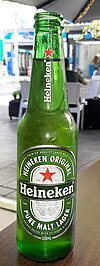 Текущее экспортное пиво ttle Текущее экспортное пиво ttle |
|
| Тип | Пиво |
|---|---|
| Производитель | Heineken International |
| Страна происхождения | Нидерланды |
| Год выпуска | 1873 |
| Объем алкоголя | 5,0% |
| Цвет | 7 EBC |
| Стиль | Светлый лагер |
| Исходная плотность | 1,044–1,048 |
| Шкала IBU | 23 |
| Сопутствующие товары | Heineken Oud Bruin. Heineken Premium Light. Heineken Tarwebok |
| Веб-сайт | Heineken.com |
Heineken Lager Beer (голландский : Heineken Pilsener) или просто Heineken (Голландское произношение: ) — светлый лагер пиво с 5% алкоголем по объему, произведенный Голландская пивоваренная компания Heineken International. Пиво Heineken продается в зеленой бутылке с красной звездочкой.
Содержание
- 1 История
- 2 Производство
- 3 Реклама
- 4 Ссылки
- 5 Внешние ссылки
История
15 февраля 1864 г., Герард Адриан Хайнекен (1841 г.) –1893) убедил свою богатую мать купить пивоварню De Hooiberg (Стог сена) в Амстердаме, популярный бренд рабочего класса, основанный в 1592 году. В 1873 году после найма доктора Элиона (ученица Луи) Pasteur ) для разработки дрожжей Heineken для баварского низового брожения, была создана HBM (Heineken’s Bierbrouwerij Maatschappij) и было сварено первое пиво марки Heineken. В 1875 году Heineken выиграл Medaille D’Or на Международной морской выставке в Париже, затем начал регулярно поставляться туда, после чего продажи Heineken превысили 64000 гектолитров (1,7 миллиона галлонов США), что сделало их крупнейшим экспортером пива во Францию.


В ранние годы Heineken пиво завоевало четыре награды:
- Medaille d’Or (Золотая медаль) на Международной морской выставке (International Maritime Exhibition). Industries) в Париже в мае 1875 года.
- Diplome d’Honneurs (Почетный диплом) на Международной колониальной выставке в Амстердаме в 1883 году.
- Гран-при (Гран-при) на Всемирной выставке в Париже в 1889 году.
- Hors Concours Membre du Jury в Париже в 1900 году.
Две награды, которые все еще упоминаются на этикетке — это Medaille d’Or и Diplome d’Honneurs.
В 2013 году Heineken присоединилась к ведущим производителям алкоголя в рамках обязательств производителей к сокращению вредного употребления алкоголя.
В конце февраля 2013 года Heineken прекратил производство коричневых бутылок, используемых для голландского рынка, в пользу бутылок зеленого цвета, которые уже использовались для экспорта.
В 2014 году Heineken отпраздновал свое 150-летие. ry. В 2015 году Heineken выиграл премию «Креативный маркетолог года», став второй компанией, дважды получившей эту награду.
Первоначальная пивоварня, где Джерард Адриан Хайнекен впервые начал производить Heineken, теперь называется Heineken Experience Museum.
Heineken выпустила свое первое безалкогольное пиво в 2017 году, назвав его «Heineken 0.0».
Производство

С 1975 года большая часть пива марки Heineken варилась в их пивоварня в Zoeterwoude, Нидерланды. В 2011 году во всем мире было произведено 2,74 миллиарда литров пива марки Heineken, в то время как общий объем производства пива на всех пивоварнях, полностью принадлежащих группе Heineken, по всем брендам составил 16,46 миллиарда литров во всем мире. Heineken продается более чем в 170 странах. Они также были объединены с многочисленными пивными брендами в странах по всему миру, включая Мексику, Китай, Австралию и различные страны Африки.
Пиво Heineken также варят в Великобритании, Ирландии, Индии, Сербии, Австралии, Новой Зеландии, Коста-Рике и Сент-Люсии для этих рынков.
Реклама
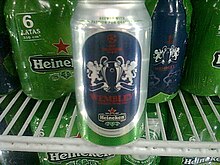
Heineken был основным спонсором Лиги чемпионов УЕФА и Чемпионата мира по регби ; Основное спонсорство Союза регби началось в Уэльсе с соревнований Уэльского премьер-дивизиона.
Начиная с 1997 года, Heineken имеет давние отношения с франшизой Бонда, последовательно снявшись в 7 их фильмах. В настоящее время это крупнейшая глобальная маркетинговая платформа бренда по состоянию на 2015 год.
В 2016 году Heineken стала официальным пивом чемпионата мира FIA Formula One, начиная с Гран-при Канады.
Ссылки
Внешние ссылки
| На Викискладе есть материалы, связанные с Heineken. |
- Официальный сайт
Бренд пива Heineken имеет долгую историю, которая берет свое начало в 1864 году в Нидерландах. Самый узнаваемый одноименный продукт известен за овальную этикетку, типичный зеленый цвет и красную пятиконечную звезду в качестве фирменного символа. На сегодняшний день пивоварни по всему миру выпускают множество марок пенного напитка, включая Amstel, Żywiec, Edelweiss, Tiger Beer, Gösser и Krušovice. В России Хайнекен производят также Guinness Original, Zlatý Bažant, Степан Разин, Жигулевское и другие виды. Расскажем, как небольшой завод превратился в международную сеть.
Содержание
- Дрожжи
- Фредди Хайнекен
- Заводы
- Пиво Feilong
- Реклама
- Музей Хайнекен
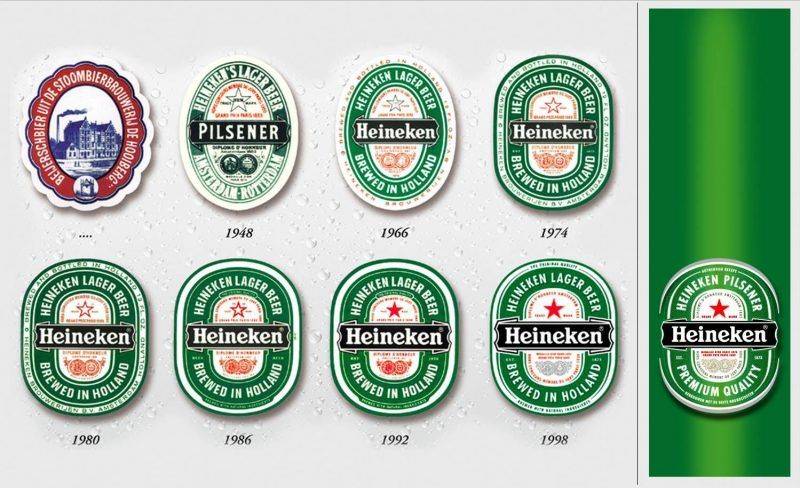
Дрожжи
В 1864 году молодой 22-летний Герард Адриан Хейнекен, проживавший в Нидерландах, купил пивоваренный завод De Hooiberg, расположенный в Амстердаме. Он назвал его своим именем и перешел на низовое брожение. Этот метод варки пива считается более совершенным, так как увеличивает срок хранения пива. Однако у напитка были большие проблемы с качеством. Дело в том, что дрожжи являются живым организмом, и порча или «заражение» пива была неизбежной из-за появления других микроорганизмов. Такая ситуация проявлялась не только у голландцев, но и на пивоварнях во всем мире. Ее помог решить французский химик и микробиолог Луи Пастер.
Ученый работал в лаборатории, созданной Генри Янгером из Abbey & Holyrood и Якобом Якобсеном из Carlsberg. Руководителем был назначен доктор Эмиль Хансен. Он стал первым, кто исследовал выращивание дрожжей из одной клетки. Вместе с ними пивовары из Хайникен обсуждали дальнейшее решение вопроса. В итоге они наняли своего специалиста Хартога Элайона. На основе уже существующих исследований он смог культивировать два чистых штамма дрожжей, известные как Heineken-A и D. С тех пор пиво стало гораздо лучшего качества.
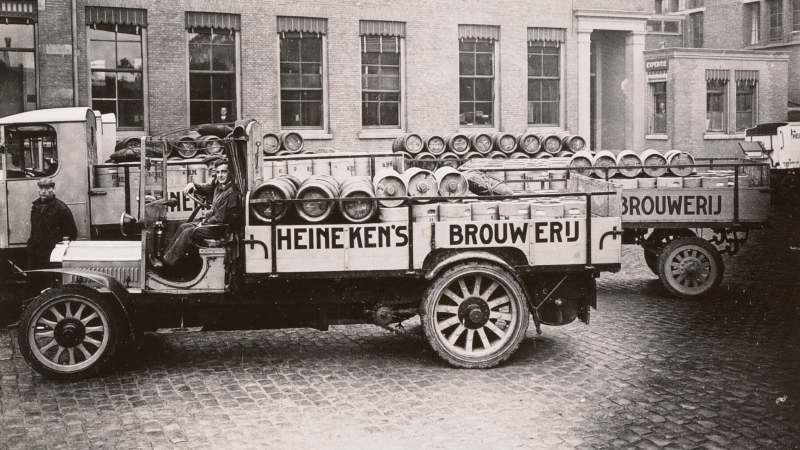
Фредди Хайнекен
После смерти основателя бренда за дело взялся его сын Генри. Он управлял компанией с 1917 по 1940 год. За это время Хейнекен разработал методы для поддержания стабильного качества пива при крупномасштабном производстве. После Первой мировой войны компания все больше внимания уделяла экспорту. Через три дня после прекращения действия запрета в Соединенных Штатах первая партия Heineken приземлилась в Нью-Йорке. С того дня бренд оставался одним из самых успешных марок импортного пива в стране.
Больше всего на судьбу продукта повлиял внук Герарда Фредди. В 1971 году он был назначен председателем исполнительного совета. В течение его правления фирма повышала стоимость акций, покупая конкурирующие пивоваренные заводы и закрывая их. Тогда же Heineken объединилась со своим крупнейшим конкурентом Amstel, а в 1975 году открыла новую пивоварню в Зутервауде.
Именно Фредди Хайнекен изменил этикетку пива и сделал ее такой, какой она стала сегодня. До этого на бутылке указывалось само название: Munchener, Dortmunder или Bavarian. Альфред решил написать только свою фамилию. Он также внедрил бутылки World Bottle, похожие на кирпичи, якобы подходящие для строительства домов. Форма не прижилась, но парочка строений навсегда осталась в качестве напоминания.
Кирпичная форма бутылки и домик из них
В жизни Фредди была даже история похищения. Его держали в заложниках 21 день и требовали выкуп – около 16 миллионов долларов. Полиции пришлось заплатить их, но преступники были пойманы. Этим событиям посвящены два фильма: «Похищение Хайнекена» 2011 года и «Похищение Фредди Хайнекена» 2014 года.
После того как был куплен первый завод в Амстердаме, появился второй в Роттердаме. В 1970-х производство Amstel переехало в Зутервауд и Хертогенбос. Это небольшие общины в Нидерландах. Бренд стал лидером не только в Европе, но и в Африке. В итоге он стал выпускать безалкогольные напитки и даже купил производство джина Bokma.
Расширение и открытие пивоварен продолжалось, и к 2006 году их было уже больше ста. После приобретения британской компании Scottish and Newcastle Heineken стал третьим по величине пивоваренным заводом по доходам после бельгийско-бразильской AB InBev и британо-южноафриканской SABMiller. Спустя 4 года было приобретено подразделение мексиканского гиганта FEMSA, что способствовало развитию деятельности в Латинской Америке.
На сегодняшний день заводы Хайнекен открыты во всех частях света: 17 компаний в Африке и на Ближнем Востоке, производства в Малайзии, Сингапуре, Новой Зеландии и десятки пивоварен в Европе. Чешский Krušovice сегодня является частью компании, так же как Starobrno, Hostan, Zlatopramen и многие другие.
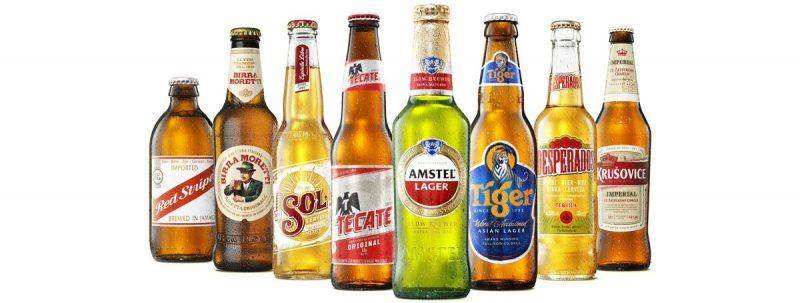
В России всего было создано 7 заводов. Они расположены в Санкт-Петербурге, Новосибирске, Стерлитамаке, Нижнем Новгороде, Екатеринбурге, Иркутске и Хабаровске. Известные марки пива, созданные у нас, включают Heineken, Amstel, Edelweiss, Guinness Original, Zlatý Bažan, Königsberg, Бочкарев, ПИТ, Охота, Степан Разин и еще около 10 наименований.
Пиво Feilong
Компания предлагает множество сортов пива, но потребителям, конечно же, этого мало. Особенно в России, где любовь к пенному напитку почти так же безгранична, как в Чехии и Германии. Нужно постоянно предлагать что-то новое. Так, например, в 2015 году Хайникен выпустил необычный продукт – рисовое пиво. Все от состава, названия и до дизайна отсылает к китайской культуре. Даже место для производства выбрано не случайно. Пиво выпускается в Восточной Сибири в непосредственной близости от Китая. Слово Feilong заимствовано из китайской мифологии. Крылатое существо Фейлонг, напоминающее дракона, является символом бога ветра.
Пиво Feilong – светлое пастеризованное с крепостью 4,3% об. По словам Джона Кахилла, директора по маркетингу Heineken в России, новое пиво производится на иркутском заводе компании:
«Сегмент рисового пива является довольно новым для российского рынка, – сказал он Сибирскому информационному агентству, – спрос неуклонно растет, особенно в Сибири и на Дальнем Востоке, где культурное влияние Китая и Японии традиционно сильно».
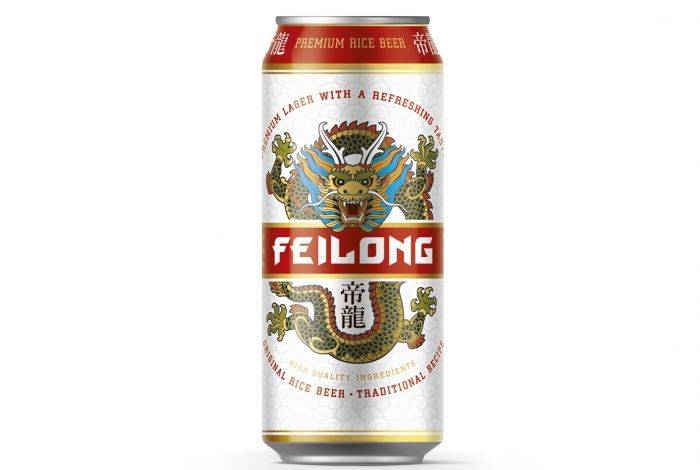
Реклама Heineken
За распространение пива в США и первые рекламные кампании отвечал Лео ван Мункинг. Именно он в 1950-е годы нанял специалистов, чтобы сфокусироваться на иностранном рынке. Цветная печатная реклама была представлена, чтобы подчеркнуть отличительную зеленую бутылку. В середине 1970-х годов сын маркетолога выпустил свои первые телевизионные ролики. Там была изображена только бутылка с надписью «Американское импортное пиво №1». Простая кампания длилась 15 лет с небольшими изменениями в формулировках и настройках фона. Затем Heineken представил Amstel Light, позиционируемое как светлое пиво премиум-класса, предназначенное для женщин. Слоган гласил: «95 калорий никогда не были такими вкусными».
К середине 1990-х годов бренд изменил стратегию, сосредоточив внимание на эмблеме в виде красной звезды. Он все еще почти не тратился на рекламу, что возможно сыграло с компанией злую шутку. Тогда на первое место вышло пиво Corona Extra.
Прорывом стал контракт с УЕФА в начале 2000-х. С тех пор вышло огромное количество рекламных роликов на футбольную тематику. Марка также является спонсором турнира по регби Heineken Cup. Перед выходом фильма «Матрица: Перезагрузка» компания выпустила рекламу, сценарий для которой написали сами сестры Вачовски. Heineken также сотрудничали с агентством Distinct Life для создания современных кампаний. Их пиво даже появлялось в фильмах про Джеймса Бонда.
Одним из известных слоганов Хайнекен был «Открой свой мир» и «Встретимся там». Однако в 2018 году бренд предложил новый вариант: «Sometimes lighter is better». В видео пиво едет по стойке мимо темнокожих и доезжает до белокожей девушки. Естественно, рекламу назвали расистской, и она была снята с эфира.
Музей Хайнекен
Оригинальная пивоварня Heineken в центре Амстердама работала более 100 лет и продолжала производить пиво до 1988 года, когда компания перенесла свои основные мощности на более крупный участок на окраине города. В 1991 году бывшая штаб-квартира была преобразована в музей, посвященный истории бренда и технологиям пивоварения. В конечном итоге это место стало одной из самых посещаемых туристических достопримечательностей в Нидерландах и получило новое имя Heineken Experience. К 150-летию компании в 2014 году музей был реконструирован с целью расширения. Были добавлены новые интерактивные выставки наряду с другими ресурсами, которые позволяют гостям познакомиться с увлекательным наследием крупнейшей пивоварни страны.
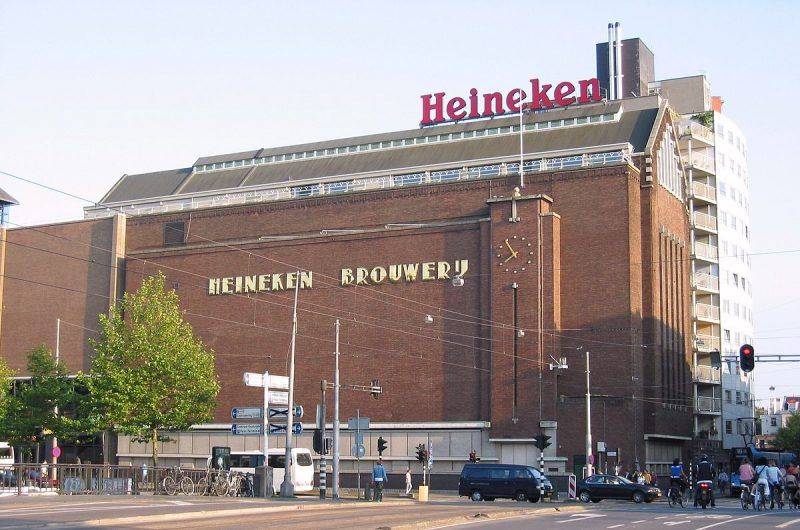
Архитектура зданий включает аутентичные интерьеры, старинные фотографии и государственные награды, полученные семьей Хайникен. В их числе знаменитая золотая медаль Международной выставки в Париже 1889 года, которую можно увидеть на каждой банке пива. Тут же проходят показы старых рекламных роликов и фильма, где актер плавает в бассейне пива. Heineken Experience в Амстердаме интересен как любителям пива, так и ценителям развлечений.
Сегодня корпорация продолжает развиваться. Она заключила контракт с Формулой-1, спонсирует Heineken Open’er Festival, музыкальный фестиваль в Польше и Oxegen в Ирландии. С 2018 года бренд является спонсором гонок Формула E на электромобилях. Что касается одежды, то и тут пивоварня умудрилась засветиться. В рамках программы Heineken100, начатой в 2010 году, Хайнекен объединялся с несколькими из самых крутых брендов для создания по 100 единиц каждого предмета. Среди них значатся Bape, NEIGHBORHOOD, Kappa и Union. Проект также был представлен в Art Base в Майами, показав эксклюзивные работы Эрика Хейза. Произведение под названием «Keeping It 100» состояло из 100 различных полотен, которые объединялись для создания более крупного художественного произведения.
Heineken был основан Жераром Адрианом Хайнекеном в 1864 году. С тех пор эта компания владеет 167 различными пивоварнями и производит пиво в 70 странах.
Изначально Heineken представлял собой светлое пиво с 5% содержанием алкоголя. В настоящее время компания производит более 300 сортов местного, регионального и международного пива, включая сидр.
Давайте выясним, почему это пиво было таким уникальным и знаменитым все эти десятилетия.
Heineken Holding NV — компания, основанная в Амстердаме, Нидерланды, 27 марта 1952 года. Компания производит и распространяет пиво и другие напитки по всему миру. Их традиционное пиво хорошо известно, и они придерживаются проверенных рецептов, которые включают в себя:
Пиво Heineken Pilsener
Компания Heineken International, базирующаяся в Голландии, производит это пиво с 5% — ным содержанием алкоголя с 1873 года. Для создания этого напитка пивоварня использовала только солодовый ячмень, качественный хмель, специальные дрожжи и очищенную воду.
Пиво Heineken Lager
Это пиво с 5% — ным содержанием алкоголя, изготовленное без каких-либо добавок, является продуктом голландской пивоварни Heineken Brouwerijen.
Пиво Heineken Extra Cold
Компания продвигает этот новый способ подачи пива. Её команда экспертов утверждает, что интенсивный холод этого вида пива прекрасно освежает в жаркие летние дни. Это традиционный Хайнекен, который подают в матовом стакане.
Пиво Heineken Premium Light
Heineken представил это светлое пиво на американском рынке в 2005 году. Оно содержит меньше калорий и углеводов и всего 3,2% алкоголя.
Пиво Heineken 0.0
Это пиво с нулевым процентом алкоголя, содержащее всего 69 калорий, сейчас в моде. Его вкус не изменился, а способ варки такой же, как и у традиционного Heineken. Разница заключается в удалении алкоголя и получении пива с солодовым и фруктовым вкусом.
Другие виды пива
Компания также производит и продает более 300 других фирменных продуктов под своей торговой маркой, в том числе:
- Ireland’s Murphy’s Stout
- Ecuador’s Biela Ecuador
- Jamacia’s Red Stripe
- Haiti’s Prestige
- Belgium’s Affligem Blonde
- Holland’s Amstel Light
- Italy’s Birra Moretti
- Dutch’s Star
- Spain’s Cruzcampo
- Poland’s Zywiec
- Congo’s Primus
- Ethiopia’s Ochota
- Indonesia’s Bintang
- Southeast Asia’s Tiger
- Malaysian’s Anchor
История
Жерару Адриану Хайнекену было всего 22 года, когда он купил пивоварню Haystack в Амстердаме 15 февраля 1864 года. Тогда голландские пивоварни, которые в основном производили эль и портер, закрывались, и эта часть промышленности приходила в упадок.
Молодой пивовар сменил название компании на Heineken и начал делать лагер. Кроме того, он расширил бизнес, купив еще одну пивоварню в Роттердаме в 1874 году.
Его потомки Генри Пьер, Альфред Генри и Шарлин де Карвалью-Хайнекен, нынешний генеральный директор, создали крупнейшую в Европе транснациональную компанию на базе этих первых пивоварен. Сегодня Heineken — это синоним голландского пива и самый узнаваемый голландский продукт.
Это пиво в зеленых бутылках входит в список самых популярных напитков, когда-либо созданных. Пиво Heineken в самом начале завоевало несколько престижных наград за пивоварение, таких как:
- Diplome d’Honneur в Амстердаме в 1883 году
- Главный приз в Париже в 1889 году
Heineken lager был первым европейским пивом, проданным на американской земле в 1933 году. Первая партия Heineken pilsner прибыла в Нью-Йорк уже через три дня после отмены запрета.
Первая и Вторая мировые войны
Производство пива во время Первой и Второй Мировых войн в Европе упало на 70%. Негативные краткосрочные последствия включали увеличение стоимости пива, но долгосрочные последствия были более серьезными.
Из-за нехватки ресурсов пивоварам пришлось искать другие заменители для производства своих напитков, и в результате в 1950-х годах появилось множество сортов пива.
Расширение компании
Heineken расширил производство пива на другие континенты и вышел на азиатские рынки в 1929 г. После покупки своего ведущего конкурента, Amstel, в 1968 г. бизнес компании начал быстро расширяться.
В 2010 году Heineken приобрел пивоварню в составе мексиканской FEMSA. Наконец, в 2017 году он купил пивоваренную компанию Lagunitas из Калифорнии и бразильскую компанию Kirin.
Современное производство Heineken происходит на 167 пивоваренных заводах в 70 странах, но активно работает более чем в 190 странах. Компания произвела более 186 млн баррелей (221,6 млн гектолитров) пива в 2020 году, в том числе 35 млн баррелей (41,8 млн гектолитров) пива Heineken.
Маркетинг
Основными мишенями Хайнекен являются молодые люди от 18 до 30 лет. Компания позиционирует свое пиво премиум-класса, спонсируя гонки Формулы-1 и футбольные матчи.
Помимо прочего, компания является спонсором Лиги чемпионов УЕФА с 1994 года. Heineken также являлось официальным пивом Высшей футбольной лиги в 2014 году.
Компания часто спонсирует популярные мировые музыкальные мероприятия, такие как:
- Ирландский музыкальный фестиваль Oxegen music festival
- Ирландский летний фестиваль в Баллихейге
- Польский фестиваль Heineken Open ‘ er Festival
Продвижение компании
Heineken вышла на рынок безалкогольного пива в 2017 году, запустив кампанию Heineken 0.0. Компания была нацелена на заботящихся о своем здоровье любителей пива.
Heineken решил повысить свою экологичность, сократив выбросы углекислого газа на своих пивоварнях на 49% за последнее десятилетие. Следующим шагом стало решение сократить потребление воды на 33%. В настоящее время они тратят всего 90 галлонов воды (3,4 гектолитра) на производство 26,5 галлонов пива (1 гектолитр).
Следующая цель-получить 70% электроэнергии из возобновляемых источников электрической и тепловой энергии.
Пивной стиль Heineken
Джерард Адриан Хайнекен купил пивоваренную компанию в 1864 году, но его внук, Генри «Фредди» Хайнекен, был тем, кто сделал ее крупным брендом.
Как только Генри стал генеральным директором, его видение состояло в том, чтобы использовать оригинальный рецепт, поддерживая неизменным высокое качество пива.
Однако он также следовал тенденциям и добавил новые стили пива, такие как крафтовое пиво, слабоалкогольное пиво, безалкогольное пиво и сидр. Результатом стал успех его напитка. В наши дни Heineken-это:
- Лучшая пивоварня в Европе
- Вторая лучшая пивоварня в мире
Ингредиенты пива Heineken
Оригинальное пиво Heineken — светлый лагер с 5% содержание алкоголя. Как мы уже упоминали, компания следует традициям, поэтому большинство их сортов пива были сделаны из четырех ингредиентов.
- Ячмень – это основное сырье, необходимое для пивоварения. Особое внимание специалисты Heineken уделяют процессу соложения, который определяет цвет пива и влияет на его аромат.
- Хмель – поскольку этот ингредиент существенно влияет на профиль пива, Heineken экспериментирует с различными видами хмеля, чтобы получить различные вкусы.
- Дрожжи — А-дрожжи Heineken известны и служат золотым стандартом для дрожжей, используемых на пивоваренных заводах компаниями по всему миру.
- Вода – поскольку она составляет около 95% пива с 5% — ным содержание алкоголя, специалисты, работающие в этой компании, делают все возможное, чтобы обеспечить самые высокие стандарты воды.
Краткие Сведения
Поскольку потребление пива в Европе за последнее десятилетие сократилось на 10%, Heineken сталкивается с новыми вызовами. Посмотрим, какие сюрпризы предложит компания, чтобы остаться на высоком уровне, который она удерживет более полутора веков.


